2019年初中英语教师资格考试学科知识与教学能力简答题题库
- 格式:docx
- 大小:12.84 KB
- 文档页数:10
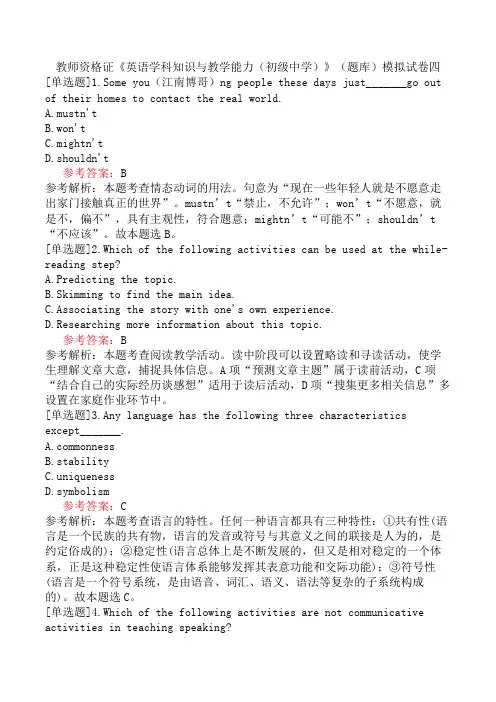
教师资格证《英语学科知识与教学能力(初级中学)》(题库)模拟试卷四[单选题]1.Some you(江南博哥)ng people these days just_______go out of their homes to contact the real world.A.mustn'tB.won'tC.mightn'tD.shouldn't参考答案:B参考解析:本题考查情态动词的用法。
句意为“现在一些年轻人就是不愿意走出家门接触真正的世界”。
mustn’t“禁止,不允许”;won’t“不愿意,就是不,偏不”,具有主观性,符合题意;mightn’t“可能不”;shouldn’t “不应该”。
故本题选B。
[单选题]2.Which of the following activities can be used at the while-reading step?A.Predicting the topic.B.Skimming to find the main idea.C.Associating the story with one's own experience.D.Researching more information about this topic.参考答案:B参考解析:本题考查阅读教学活动。
读中阶段可以设置略读和寻读活动,使学生理解文章大意,捕捉具体信息。
A项“预测文章主题”属于读前活动,C项“结合自己的实际经历谈感想”适用于读后活动,D项“搜集更多相关信息”多设置在家庭作业环节中。
[单选题]3.Any language has the following three characteristics except_______.monnessB.stabilityC.uniquenessD.symbolism参考答案:C参考解析:本题考查语言的特性。
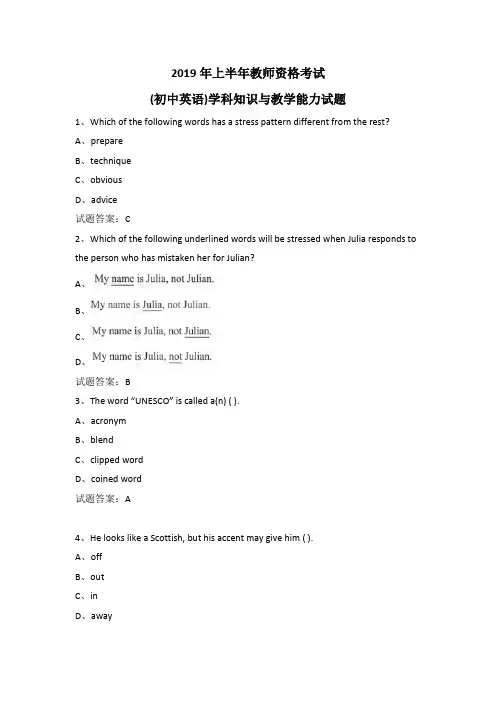
2019年上半年教师资格考试(初中英语)学科知识与教学能力试题1、Which of the following words has a stress pattern different from the rest?A、prepareB、techniqueC、obviousD、advice试题答案:C2、Which of the following underlined words will be stressed when Julia responds to the person who has mistaken her for Julian?A、B、C、D、试题答案:B3、The word “UNESCO” is called a(n) ( ).A、acronymB、blendC、clipped wordD、coined word试题答案:A4、He looks like a Scottish, but his accent may give him ( ).A、offB、outC、inD、away试题答案:'D5、The book is so well received that it sells ( )the million.A、atB、inC、byD、to试题答案:c6、( )we are successful, we can be sure that we did our best.A、Provided thatB、If onlyC、If or notD、Whether or not试题答案:d7、—Will you be able to go swimming with us?— ( ).A、I’m afraid notB、I’m afraidC、I’m not afraidD、I’m not afraid so试题答案:a8、( ) is the custom,the investigators carried out a painstaking search of the debris after the air crash.A、WhatB、AsC、WhichD、That试题答案:b9、There are different words for paternal grandmother (nainai) and maternal grandmother(waipo) in Chinese, but in English the word “grandmother” is generally used in both cases, which suggests that ( ).A、equal importance is given to maternal and paternal grandparents in ChinaB、equal importance is given to maternal and paternal grandparents in BritainC、language may influence people’s ways of thinking to a large extentD、people of different languages categorize things in different ways试题答案:d10、Which of the following is employed by a speaker who addresses senior people as “the elderly” rather than “the old”?A、Social dialect.B、Taboo.C、Lingua franca.D、Euphemism.试题答案:d11、By asking the question, “Can you list your favorite food in English?” , the teacher is using the technique of ( ).A、elicitationB、monitoringC、promptingD、recasting试题答案:a12、If a teacher wants to check how much students have learned at the end of a term, he/she would give them a(n) ( ).A、diagnostic testB、placement testC、proficiency testD、achievement test试题答案:d13、What learning style does Xiao Li exhibit if she tries to understand every single word when listening to a passage?A、Field-dependence.B、Intolerance of Ambiguity.C、Risk-taking.D、Field-independence.试题答案:b14、If a teacher asks students to put jumbled sentences in order in a reading class, he/she intends to develop their ability of ( ).A、word-guessing through contextB、summarizing the main ideaC、understanding textual coherenceD、scanning for detailed information试题答案:c15、When a teacher says “What do you mean by that?”,he/she is asking the student for ( ).A、repetitionB、suggestionC、introductionD、clarification试题答案:d16、When a teacher says “You’d better talk in a more polite way when speaking to the elderly.”,he/she is drawing the students’ attenti on to the of language use( ).A、fluencyB、complexityC、accuracyD、appropriacy试题答案:d17、Which of the following is a display question?A、What part of speech is “immense”?B、How would you comment on this report?C、Why do you think Hemingway is a good writer?D、What do you think of the characters in this novel?试题答案:a18、Which of the following represents a contextualized way of practising “How often ...” ?A、Make some sentences with “how often” .B、Use “how often" and the words given to make a sentence.C、I go shopping twice a week. How often do you go shopping?D、Please change the statement into a question with “how often” .试题答案:c19、Which of the following are controlled activities in an English class?A、Reporting, role-play and games.B、Reading aloud, dictation and translation.C、Role-play, problem solving and discussion.D、Information exchange, narration and interview.试题答案:b20、The ( )is designed according to the morphological and syntactic aspects of a language.A、structural syllabusB、situational syllabusC、skill-based syllabusD、content-based syllabus试题答案:a阅读理解The brain is truly a marvel. A seemingly endless library, whose shelves house our most precious memories as well as our lifetime’s knowledge. But is there a point where it reaches capacity? In other words, can the brain be “full”?The answer is a resounding no, because, well, brains are more sophisticated than that. A study published in Nature Neuroscience earlier this year shows that instead of just crowding in, old information is sometimes pushed out of the brain for new memories to form.Previous behavioral studies have shown that learning new information can lead to forgetting. But in this study, researchers used new neuroimaging techniques to demonstrate for the first time how this effect occurs in the brain.The paper’s authors set out to investigate what happens in the brain when we try to remember information that’s very similar to what we already know. This is important because similar information is more likely to interfere with existing knowledge, and it’s the stuff that crowds without being useful.To do this, they examined how brain activity changes when we try to remember a “target” memory, that is, when we try to recall something very specific, at the same time as trying to remember something similar (a “competing” memory). Participants were taught to associate a single word (say, the word sand) with two different images—such as one of Marilyn Monroe and the other of a hat.They found that as the target memory was recalled more often, brain activity for it increased. Meanwhile, brain activity for the competing memory simultaneouslyweakened. This change was most prominent in regions near the front of the brain, such as the prefrontal cortex, rather than key memory structures in the middle of the brain, such as the hippocampus, which is traditionally associated with memory loss.The prefrontal cortex is involved in a range of complex cognitive processes, such as planning, decision making, and selective retrieval of memory. Extensive research shows this part of the brain works in combination with the hippocampus to retrieve specific memories.If the hippocampus is the search engine, the prefrontal cortex is the filter determining which memory is the most relevant. This suggests that storing information alone is not enough for a good memory. The brain also needs to be able to access the relevant information without being distracted by similar competing pieces of information.In daily life, forgetting actually has clear advantages. Imagine, for instance, that you lost your bank card. The new card you receive will come with a new personal identification number (PIN). Research in this field suggests that each time you remember the new PIN, you gradually forget the old one. This process improves access to relevant information, without old memories interfering.When we acquire new information, the brain automatically tries to incorporate it within existing information by forming associations. And when we retrieve information, both the desired and associated but irrelevant information is recalled.The majority of previous research has focused on how we learn and remember new information. But current studies are beginning to place greater emphasis on the conditions under which we forget, as its importance begins to be more appreciated.21、Which of the following is closest in meaning to the underlined word“resounding” in Paragraph 2?A、Definite.B、Repetitive.C、Echoing.D、Impressive.22、According to the passage, why can’t our brain be “full”?A、It can forget what we want to remember.B、It can memorize what we want to remember.C、It can store limitless information like a library.D、It forgets the old information while absorbing the new.23、According to the passage, which part of our brain is traditionally considered to be fundamental to the formation of new memories?A、The frontal cortex.B、The middle of the brain.C、The prefrontal cortex.D、The back part of the brain.24、What is the main purpose of writing this article?A、To interpret why our memory loss occurs.B、To elaborate how we retrieve specific memories.C、To explain why our memory capacity seems to be limitless.D、To present the balance between remembering and forgetting.25、Which of the following is likely to be discussed in the subsequent study?A、The influence of memory.B、The conditions related to forgetting.C、The ways used to prevent forgetting.D、The factors involved in memory formation.试题答案:[['A'],['D'],['B'],['C'],['B']]For most American kids, it wouldn’t be Halloween w ithout trick-or-treating for candy; however, that wasn’t always the case. When the custom of trick-or-treating started in the 1930s and early 1940s, children were given everything fromhomemade cookies and pieces of cake to fruit, nuts, coins and toys. In the 1950s, candy manufacturers began to get in on the act and promote their products for Halloween, and as trick-or-treating became more popular, candy was increasingly regarded as an affordable, convenient offering. It wasn’t until the 1970s, though, that wrapped, factory-made candy was viewed as the only acceptable thing to hand out to all the little ghosts and goblins that showed up on people’s doorsteps. A key reason for this was safety, as parents feared that real-life boogeymen might tamper with goodi es that weren’t store-bought and sealed.Today, when it comes to Halloween candy, a number of the most popular brands are enduring classics. For example, the first Hershey’s Milk Chocolate bar was produced in 1900 and Hershey’s Kisses made their debut in 1907. Company founder Milton Hershey was a pioneer in the mass- production of milk chocolate and turned what previously had been a luxury item for the well-to- do into something affordable for average Americans. In the early 1900s, he also built an entire town, Hershey, Pennsylvania, around his chocolate factory. In 1917, Harry Burnett Reese moved to Hershey, where he was a dairyman for the chocolate company and later worked at its factory. Inspired by Milton Hershey’s success, Reese, who eventually had 16 children, began making candies in his basement. In the mid-1920s, he built a factory of his own and produced an assortment of candies, including peanut butter cups, which he invented in 1928 and made with Hershey’s chocolate. During World War II, a shortage of ingredients led Reese to pull the plug on his other candies and focus on his most popular product, peanut butt cups. In 1963, Hershey acquired the H.B Reese Candy Company.In 1923, a struggling, Minnesota-born candy maker, Frank Mars, launched the Milky Way bar, which became a best-seller. In 1930, he introduced the Snickers bar, reportedly named for his favorite horse, followed in 1932 by the 3 Musketeers bar. Frank’s son Forrest eventually joined the company, only to leave after a falling out with his father. Forrest Mars relocated to England, where he created the Mars bar in the early 1930s. In 1941, he launched M&Ms. Mars anticipated that World War II would produce a cocoa shortage, so he partnered with Bruce Murrie, son of aHershey executive, in order to have access to a sufficient supply of ingredients; the candy’s name stands for Mars and Murrie.Another crowd-pleasing Halloween candy, the Kit Kat bar, was first sold in England in 1935 as a Rowntree’s Chocolate Crisp and in 1937 was rechristened the Kit Kat Chocolate Crisp. The name is said to be derived from a London literary and political group, the Kit-Cat (or Kit Kat) club, established in the late 17th century. The group’s moniker is thought to be an abbreviation of the name of the man who owned the shop where the group originally gathered. Since 1988, the brand has been owned by Nestle, maker of another perennial trick-or-treat favorite, the Nestle Crunch bar, which debuted in the late 1930s.What are the main features of Halloween candy in the 1970s?A、Safe, wrapped and factory-made.B、Original, homemade and expensive.C、Delicious, manufactured and expensive.D、Convenient, homemade and inexpensive.Who does the underlined word “boogeymen” in Paragraph 1 refer to?A、Evil spirits haunting kids.B、People with evil intentions.C、Kids in Halloween costumes.D、Candy makers and store keepers.Which of the following correctly describes Milton Hershey?A、He mass-produced milk chocolate bars for the wealthy.B、He duplicated the brand of Hershey’s Kisses in 1907 for Halloween.C、He employed Harry Burnett Reese who later founded his own company.D、He encouraged Forrest Mars and Bruce Murrie to jointly produce M&Ms.How was the name “Kit Kat Chocolate Crisp” derived?A、It was renamed by Nestle, another maker of the Halloween candies.B、It was borrowed from the name of Rowntree’s Chocolate Crisp.C、It was named after a London literary and political group.D、It was abbreviated from the name of a shop owner.What is the passage mainly about?A、The names and brands of Halloween candies.B、The origin and history of Halloween candies.C、The popularity and fame of Halloween candies.D、The consumers and manufacturers of Halloween candies.试题答案:[['A'],['B'],['C'],['C'],['B']]23、根据题目要求完成下列任务,用中文作答。
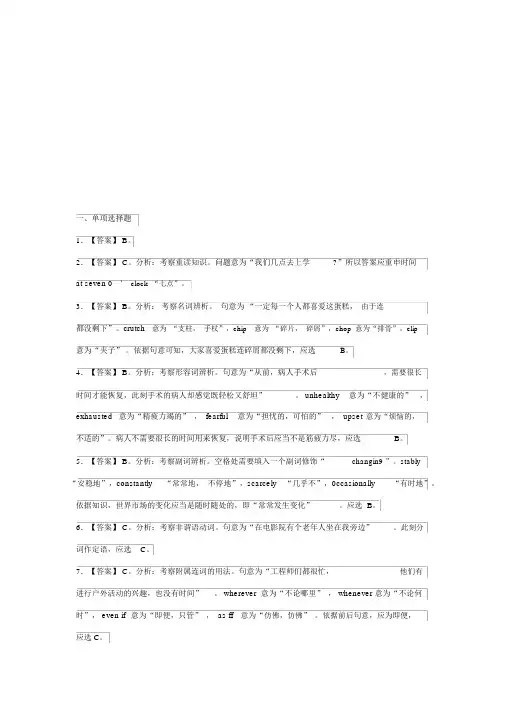
一、单项选择题1.【答案】 B。
2.【答案】 C。
分析:考察重读知识。
问题意为“我们几点去上学?”所以答案应重申时间at seven 0’ clock“七点”。
3.【答案】 B。
分析:考察名词辨析。
句意为“一定每一个人都喜爱这蛋糕,由于连__________都没剩下”。
crutch意为“支柱,手杖”,chip意为“碎片,碎屑”,chop意为“排骨”,clip意为“夹子”。
依据句意可知,大家喜爱蛋糕连碎屑都没剩下,应选B。
4.【答案】 B。
分析:考察形容词辨析。
句意为“从前,病人手术后__________ ,需要很长时间才能恢复,此刻手术的病人却感觉既轻松又舒坦”。
unhealthy意为“不健康的”,exhausted意为“精疲力竭的” ,fearful意为“担忧的,可怕的”,upset意为“烦恼的,不适的”。
病人不需要很长的时间用来恢复,说明手术后应当不是筋疲力尽,应选B。
5.【答案】 B。
分析:考察副词辨析。
空格处需要填入一个副词修饰“changin9 ”。
stably“安稳地”,constantly“常常地,不停地”,scarcely“几乎不”,0ccasionally“有时地”。
依据知识,世界市场的变化应当是随时随处的,即“常常发生变化”。
应选 B。
6.【答案】 C。
分析:考察非谓语动词。
句意为“在电影院有个老年人坐在我旁边”。
此刻分词作定语,应选C。
7.【答案】 C。
分析:考察附属连词的用法。
句意为“工程师们都很忙,__________他们有进行户外活动的兴趣,也没有时间”。
wherever 意为“不论哪里” , whenever 意为“不论何时”, even if意为“即便,只管” ,as ff意为“仿佛,仿佛” 。
依据前后句意,应为即便,应选 C。
8.【答案】 C。
分析:考察虚构语气。
在表示梦想、建议、恳求、命令等时, it is imperative that构造后边的主语从句一定用虚构语气,即should+动词原形(should能够省略)。
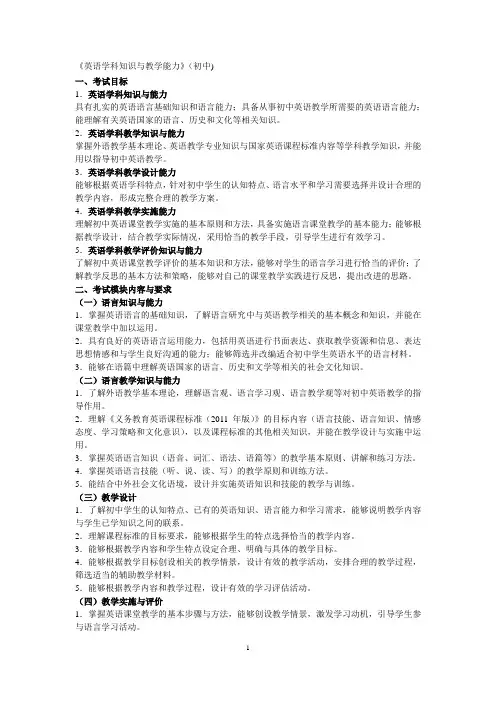
《英语学科知识与教学能力》(初中)一、考试目标1.英语学科知识与能力具有扎实的英语语言基础知识和语言能力;具备从事初中英语教学所需要的英语语言能力;能理解有关英语国家的语言、历史和文化等相关知识。
2.英语学科教学知识与能力掌握外语教学基本理论、英语教学专业知识与国家英语课程标准内容等学科教学知识,并能用以指导初中英语教学。
3.英语学科教学设计能力能够根据英语学科特点,针对初中学生的认知特点、语言水平和学习需要选择并设计合理的教学内容,形成完整合理的教学方案。
4.英语学科教学实施能力理解初中英语课堂教学实施的基本原则和方法,具备实施语言课堂教学的基本能力;能够根据教学设计,结合教学实际情况,采用恰当的教学手段,引导学生进行有效学习。
5.英语学科教学评价知识与能力了解初中英语课堂教学评价的基本知识和方法,能够对学生的语言学习进行恰当的评价;了解教学反思的基本方法和策略,能够对自己的课堂教学实践进行反思,提出改进的思路。
二、考试模块内容与要求(一)语言知识与能力1.掌握英语语言的基础知识,了解语言研究中与英语教学相关的基本概念和知识,并能在课堂教学中加以运用。
2.具有良好的英语语言运用能力,包括用英语进行书面表达、获取教学资源和信息、表达思想情感和与学生良好沟通的能力;能够筛选并改编适合初中学生英语水平的语言材料。
3.能够在语篇中理解英语国家的语言、历史和文学等相关的社会文化知识。
(二)语言教学知识与能力1.了解外语教学基本理论,理解语言观、语言学习观、语言教学观等对初中英语教学的指导作用。
2.理解《义务教育英语课程标准(2011年版)》的目标内容(语言技能、语言知识、情感态度、学习策略和文化意识),以及课程标准的其他相关知识,并能在教学设计与实施中运用。
3.掌握英语语言知识(语音、词汇、语法、语篇等)的教学基本原则、讲解和练习方法。
4.掌握英语语言技能(听、说、读、写)的教学原则和训练方法。
5.能结合中外社会文化语境,设计并实施英语知识和技能的教学与训练。
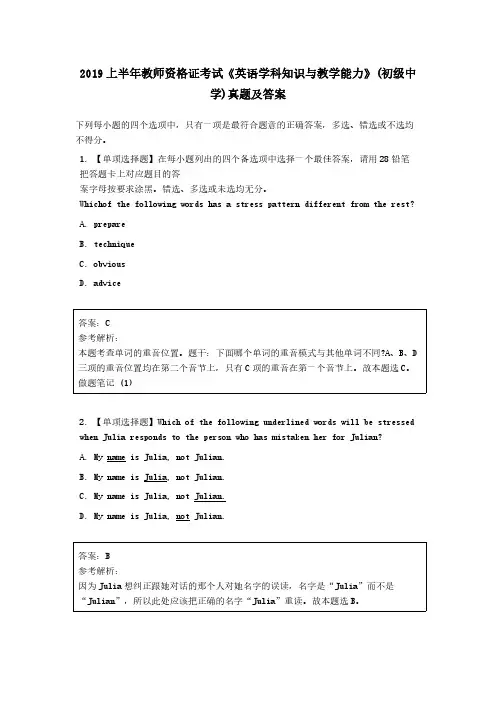
2019上半年教师资格证考试《英语学科知识与教学能力》(初级中学)真题及答案下列每小题的四个选项中,只有一项是最符合题意的正确答案,多选、错选或不选均不得分。
1.【单项选择题】在每小题列出的四个备选项中选择一个最佳答案,请用28铅笔把答题卡上对应题目的答案字母按要求涂黑。
错选、多选或未选均无分。
Whichof the following words has a stress pattern different from the rest?A.prepareB.techniqueC.obviousD.advice答案:C参考解析:本题考查单词的重音位置。
题干:下面哪个单词的重音模式与其他单词不同?A、B、D 三项的重音位置均在第二个音节上,只有C项的重音在第一个音节上。
故本题选C。
做题笔记(1)2.【单项选择题】Which of the following underlined words will be stressed when Julia responds to the person who has mistaken her for Julian?A.My name is Julia,not Julian.B.My name is Julia,not Julian.C.My name is Julia,not Julian.D.My name is Julia,not Julian.答案:B参考解析:因为Julia想纠正跟她对话的那个人对她名字的误读,名字是“Julia”而不是“Julian”,所以此处应该把正确的名字“Julia”重读。
故本题选B。
3.【单项选择题】Theword“UNESCO”is called a(n)_______.A.acronymB.blendC.clipped wordD.coined word答案:A参考解析:本题考查构词法。
A项“首字母缩略词”指由几个单词的首字母派生出来的新词;B 项意为“混成词”;C项意为“截断词”;D项意为“新创词”。
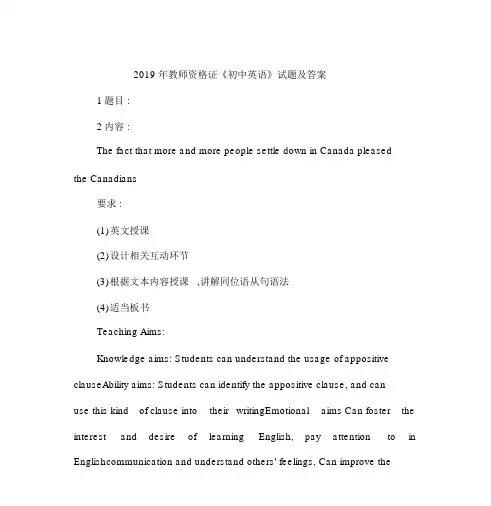
2019 年教师资格证《初中英语》试题及答案1题目 :2内容 :The fact that more and more people settle down in Canada pleasedthe Canadians要求 :(1)英文授课(2)设计相关互动环节(3)根据文本内容授课 ,讲解同位语从句语法(4)适当板书Teaching Aims:Knowledge aims: Students can understand the usage of appositive clauseAbility aims: Students can identify the appositive clause, and canuse this kind of clause into their writingEmotional aims Can foster the interest and desire of learning English, pay attention to in Englishcommunication and understand others' feelings, Can improve theconfidence of learning English, and not afraidof speaking English; Can cooperate with other group mates actively, and complete the tasks togetherTeaching Key points:Get the sentence structure and its mof each sentence. and can induct the rules of the functions ofTeaching Difficult Points:Use the appositive clause in proper situations; can identify the clause type in different situations,espec ially can distinguish theappositive clause.Teaching Methods:Inductive Method, Task-based Teaching Method, Found-type MethodTeaching Aids:Mult-mediaTeaching procedures:Step I Warming-upAsk students to watch a video clip which selected from the movie Despicable Me firstly, and then askthem what kind ofgrammatical phenomenon they can findFirst of all, you got no proof that I did that!There is clear evidence that vou did that!I will lead them to think about the relation between theword"proof"and the sentence i. Then come to theconclusion: the sentence is appositive of proof. And today were going to learn the appositive clauseI Show some sentences on the blackboard, and ask students to discuss the function of the underlined partof 4They were worned over the fact that you were sick.After they finished, I will invite group leaders to share their views.And come to the conclusion that theThis clause always appears after the related noun closely.Step 3 Practice1.Ask students to make sentences by using appositive clause.Step pRoductionRole-Play time! Suppose Mike and Mary are coming to our schooland you are going to be the guide tointroduce to them about our school with appositive clause as muchas you can I'll give you ten minutes todesign a short play, four people in a group. Then I'll let some of them to share with us! Start.Step 5 Summaryaretwo sentences on the PPT. One is appositive clause, and the other one is attributive clause.Please find out the differences between the appositive clause andthe attributive clause! How do we distinguishthem from each other?i will invite some of them to share with us tomorrow题目假设你又是李明,参加了“澳大利亚英语夏令营”为期两周,住在格林夫妇家,他们为你提供吃住行及旅游帮助 ,请给格林夫妇写信:安全到家 : 感谢 :澳大利亚感受:保持联系Dear Mr and Mrs _ JohnsonIm writing to you from my home in China. I have returned home safe and sound. When I think of the wonderfulwo weeks I spent in America,I just cant help thinking of both of you.You prowided everything to make me feel athome. Your generous help and tender care transformed my first Amencan tnp into an unforgettable memory.Additionally, I've leamed so much, not only English but also culture, which greatly enlarges my knowledge.AndIreally enjoyed a great deal of fun and laughter we shared with each other, especially the ideas we exchange about whathave in common. Thank you very much. I'lI always remember this trip as well as your kindnessI'll keep in touch and write to you later. Please take care!Yours Li Ming3.基本要求(1)全英试讲(2)指导学生学会写信(3)互动环节(4)配合适当板书I Teaching AimsStudents can understand basic structure of a letter and kno w howdo they write a letter in replyAbility aimsStudents will be able to get the main infomation of the original letterAccording to the sample, students can write a letter in replyEmotional aimsStudents would like to join some activities to improve their writingabilityThey can understand the letter culture in English countries lI Teaching Key & Difficult Pointsgkey1.Master the basic structure of English letter2.Students can write a letter inTeaching Difficult Points2. Students can improve the confidence of writing, and not afraid of writing EnglishIll Teaching procedureseparmI will ask them some questions to lead in the topicODo you have a pen-pal, and do you often write to him or her?2What kinds of topic do you usually discuss in your letters?@Do you know how to reply a letter?After they answerstions, I will tell them today we are going to leam to reply a letter.Step 2 Pre-writingLet them read the letter and find out the information of letter should include. (a letter should includeaddress, main body, complimentary close, and signature; and in themain body, we should express the purposeof this letter clearly, sometimes it is for thanking, sometimes for apologizing, and sometimes for discussing orInvitingAsk them to read the letter on the book and then tell me what theyare talking about. While I will ask themto answer the following questionsWhy did Li Ming write this letter?Why did Li Ming feel great during that time:Image they are Mr or Mrs Johnson and ask them to write a reply letter to Li Ming. What would you sayto Li Ming. Ask the students to have a discussionStep 3 While-writingImage they are Mr. or Mrs. Johnson and ask them to write a replyletter to Li Ming, they can write theeply letter according to the above discussion. While writing,I will ask them to pay more attention to thespelling, grammar, and the logic of sentences.Step 4 Post-writingAfter they finished the writing, I will ask them to modify their draftsby themselves, and then exchangetheir draft to do the pair editingThen I will ask some studentsto read their letters to us, and let them give some suggestions togetherStep 5 Summary and homeworkSummary: Ask one student to summarize what they have leamt today. Then the teacher will add ifHomework: Surf the intemet and find out other function of lettersStep 4: Post-readingRetell the passage according to the chart we have madeInvite students to enjoy some clips of Tea House, and express their feelings about them.Step 5: Summary HomeworkAsk students to review the key points together.Homework: write a short passage about their favorite play of lao sheIVBlackboard design题目 : Is there a bank around here?2内容Tony: Hi, excuse meLinda: Yes. How can I help you?Tony: Well, I am new in town. Is there a bank around here?Linda: Yes, there is. It is on Center Street It is across from the park.Tony: where is Center Street?Linda: It is not far from here. I can walk with youTony: Oh, thats great! Thank you so much.Linda: No problem3.基本要求(1)全英授课(2)要有与学生的互动(3)教学生如何给他人指路I Teaching aimsKnowledge aimsStudents will learn some new words and sentence patterns about asking ways1. Students can enhance their gist listening ability and get to know some spermation2.Students can get the ability of reading mapsEmotional aimsStudents will be ready to help others and dare to speak oral English in daily lifeII Teaching Key & Difficult PointsTarget language: Is there.. Where is...?Difficult point:Students know how to give night directions to others in EnglishIlrTeaching procedures:Step 1: Warming upGreet as usualInvite the whole class to sing the song Little Star, after singing, I willtell them we can recognizedirections according to the star, and ask them a question: Do you know other tools for giving directions? Whatare they?Step 2: Pre-listeningShow some words of this listening materal and use the corresponding pictures to help students understandthe meaning. The new words include park, bank, Center Street, town.Step 3: While-listeningListen to the tape for the first time, and ask students to answer the question on the screenWhat are they talking about?2. Intensive listeningAsk students to listen care fully and draw a simple map with the places mentioned in the tape. MeanwhileIvite one student draw the picture on the blackboardAfter students finish the activity, according to the map the studentdraw on the blackboard, I will ask: Isthere. And Where is. ?Students answer questions. At this time, write the important sentence structures on theblackboardListen to the tape and pay attention to the target languageStep 4: Post-listeningImagine there is a foreign friend comes to visit your school and wantsary, youto give him the right directions, work in pairs and make a dialogue,later to perform out.Step 5: Summary Homework1.Ask students to summarize what they have learnt in this class2.After class, please design a route map to introduce how to get to West LakeBLAckboard design1.BE: Musicians Wanted for School Music FestivalMusicians Wanted for School Music FestivalAre you a musician? Can you sing? Can you dance? Can you play the piano, the trumpet, the drums, orthe guitar? Then you can be in our school music festival. Please call Zhang Heng at 622-6033.3.基本要求(1)全英试讲(2)朗读课文(3)讲划线词语(4)配合适当板书I Teaching AimsStudents will be able to master the meaning and usage by given words related to musicStudents can recognize different instrument and speak out the right wordsEmotional aimStudents will be more interested in music and broaden horizon of different instrument.II Teaching Key Difficult PointsKey point: master the usage of these new words musician, piano, trumpet, drum, guitarDifficult point: How to recognize these different instrumentIlITeaching procedures:Step 1: Warming upPlay an English song Ode to Joy and invite students to sing together, after singing, introduce the famoumusician of this song- Beethoven and naturally lead in todays topicStep 2: PresentationShow the short notice: Musicians Wanted for School Music Festival, read it affectionately to studentsnd teach the underlined word"musician"with the picture of Beethoven and show other famous musicians tobroaden their horizon2. Show the pictures of other four words, describe the shape and play the corresponding sound with themulti-media to help students recognize these instrument3. After teaching, let them read for three times, pay attention to the pronunciationStep 3: Practice1. Do a voice game. If I read the words in high voice, they shouldread in low voice; if I read in low voice,they should read in high voice. I will divide them into several groupsto do this game2. Play a guessing game. Listen to me carefully, and guess what it is.For example: It is large, it has black-and-white keys, Langlang is good at playing itStep 4: ProductioPlay the selected part of famous film Rio, let students to imitate the sound instrument of it and fourstudents in a group to design a short play, them perform out.Step 5: Summary Homework2. After class, ask students to search some other instrument they like and imitate the sound of oneIV Blackboard design。
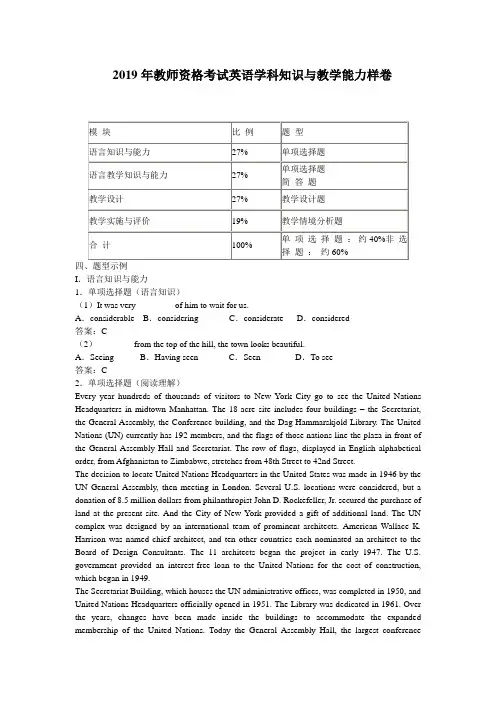
2019年教师资格考试英语学科知识与教学能力样卷四、题型示例I.语言知识与能力1.单项选择题(语言知识)(1)It was very ________ of him to wait for us.A.considerable B.considering C.considerate D.considered答案:C(2)________ from the top of the hill, the town looks beautiful.A.Seeing B.Having seen C.Seen D.To see答案:C2.单项选择题(阅读理解)Every year hundreds of thousands of visitors to New York City go to see the United Nations Headquarters in midtown Manhattan. The 18-acre site includes four buildings –the Secretariat, the General Assembly, the Conference building, and the Dag Hammarskjold Library. The United Nations (UN) currently has 192 members, and the flags of those nations line the plaza in front of the General Assembly Hall and Secretariat. The row of flags, displayed in English alphabetical order, from Afghanistan to Zimbabwe, stretches from 48th Street to 42nd Street.The decision to locate United Nations Headquarters in the United States was made in 1946 by the UN General Assembly, then meeting in London. Several U.S. locations were considered, but a donation of 8.5 million dollars from philanthropist John D. Rockefeller, Jr. secured the purchase of land at the present site. And the City of New York provided a gift of additional land. The UN complex was designed by an international team of prominent architects. American Wallace K. Harrison was named chief architect, and ten other countries each nominated an architect to the Board of Design Consultants. The 11 architects began the project in early 1947. The U.S. government provided an interest-free loan to the United Nations for the cost of construction, which began in 1949.The Secretariat Building, which houses the UN administrative offices, was completed in 1950, and United Nations Headquarters officially opened in 1951. The Library was dedicated in 1961. Over the years, changes have been made inside the buildings to accommodate the expanded membership of the United Nations. Today the General Assembly Hall, the largest conferenceroom, seats more than 1,800 people.The UN Headquarters site is international territory owned by the member nations. It has its own security force, fire department, and postal service. The postal service issues stamps that can only be mailed from the Headquarters; tourists often mail postcards bearing these stamps.Taking a guided tour is the only way for visitors to see the inside of the UN Headquarters. Tours are led by professional guides representing all the member nations and are conducted in many different languages. Visitors taking a tour see exhibits, various council chambers, and the General Assembly Hall. If their timing is good, they might even see a council meeting in session.The United Nations Headquarters displays many beautiful and meaningful works of art created specially for its halls and chambers. Sculptures and statues donated by member nations adorn the grounds of the complex. One sculpture, the Japanese Peace Bell, was made from the metal of coins collected from 60 different countries. Japan presented the bell to the United Nations in 1954, and it is rung every year on September 21, the International Day of Peace.The Peace Bell and other sculptures, as well as paintings and murals inside the buildings, create an impression of grandeur and dignity, reflecting the importance of the work being done at the United Nations.(1)If you want to see the flag of the People’s Republic of China in front of the UN headquarters, you would most probably find it ________.A.near the 48th streetB.near the 42nd streetC.in the middle between 48th and 42nd streetsD.in the third position from the flag of Afghanistan答案:C(2)The UN was most likely formed ________.A.before 1946 B.after 1946 C.in 1950 D.in 1947答案:A(3)As a response to the increase in the UN membership, ________ to meet the needs over the years.A.more buildings have been built B.internal changes have been madeC.old buildings have been enlarged D.more new land has been purchased答案:B(4)Which of the following statements about the tour guide is true?A.A tour guide may show his pride of his home country before visitors.B.Each member country sends its tour guide to work in the UN Headquarters.C.Each tour guide must be able to speak the languages of the member countries.D.A tour guide should not just feel proud of his own home country before visitors.答案:C(5)This article is most likely written for ________.A.general newspapers B.magazines on architectural artC.books on the international affairs D.encyclopedic information brochure for students答案:DII.语言教学知识与能力1.单项选择题Which of the following activities does not belong to mechanical practice?A.Transformation. B.Sentence making. C.Substitution. D.Making up a story.答案:D2.简答题(中文作答)(1)blackboard这个词由哪两个部分组成?该词的重音位置在哪里?请描述相关的语音规律。
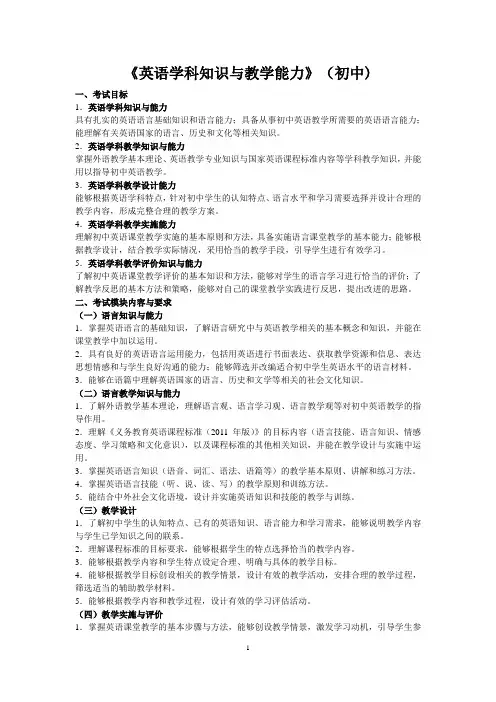
《英语学科知识与教学能力》(初中)一、考试目标1.英语学科知识与能力具有扎实的英语语言基础知识和语言能力;具备从事初中英语教学所需要的英语语言能力;能理解有关英语国家的语言、历史和文化等相关知识。
2.英语学科教学知识与能力掌握外语教学基本理论、英语教学专业知识与国家英语课程标准内容等学科教学知识,并能用以指导初中英语教学。
3.英语学科教学设计能力能够根据英语学科特点,针对初中学生的认知特点、语言水平和学习需要选择并设计合理的教学内容,形成完整合理的教学方案。
4.英语学科教学实施能力理解初中英语课堂教学实施的基本原则和方法,具备实施语言课堂教学的基本能力;能够根据教学设计,结合教学实际情况,采用恰当的教学手段,引导学生进行有效学习。
5.英语学科教学评价知识与能力了解初中英语课堂教学评价的基本知识和方法,能够对学生的语言学习进行恰当的评价;了解教学反思的基本方法和策略,能够对自己的课堂教学实践进行反思,提出改进的思路。
二、考试模块内容与要求(一)语言知识与能力1.掌握英语语言的基础知识,了解语言研究中与英语教学相关的基本概念和知识,并能在课堂教学中加以运用。
2.具有良好的英语语言运用能力,包括用英语进行书面表达、获取教学资源和信息、表达思想情感和与学生良好沟通的能力;能够筛选并改编适合初中学生英语水平的语言材料。
3.能够在语篇中理解英语国家的语言、历史和文学等相关的社会文化知识。
(二)语言教学知识与能力1.了解外语教学基本理论,理解语言观、语言学习观、语言教学观等对初中英语教学的指导作用。
2.理解《义务教育英语课程标准(2011年版)》的目标内容(语言技能、语言知识、情感态度、学习策略和文化意识),以及课程标准的其他相关知识,并能在教学设计与实施中运用。
3.掌握英语语言知识(语音、词汇、语法、语篇等)的教学基本原则、讲解和练习方法。
4.掌握英语语言技能(听、说、读、写)的教学原则和训练方法。
5.能结合中外社会文化语境,设计并实施英语知识和技能的教学与训练。
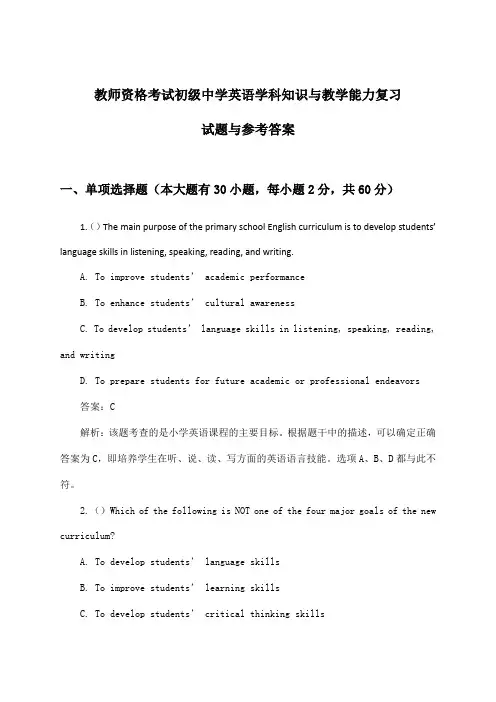
教师资格考试初级中学英语学科知识与教学能力复习试题与参考答案一、单项选择题(本大题有30小题,每小题2分,共60分)1.()The main purpose of the primary school English curriculum is to develop students’ language skills in listening, speaking, reading, and writing.A. To improve students’ academic performanceB. To enhance students’ cultural awarenessC. To develop students’ language skills in listening, speaking, reading, and writingD. To prepare students for future academic or professional endeavors答案:C解析:该题考查的是小学英语课程的主要目标。
根据题干中的描述,可以确定正确答案为C,即培养学生在听、说、读、写方面的英语语言技能。
选项A、B、D都与此不符。
2.()Which of the following is NOT one of the four major goals of the new curriculum?A. To develop students’ language skillsB. To improve students’ learning skillsC. To develop students’ critical thinking skillsD. To develop stud ents’ cultural awareness答案:D解析:该题询问新课程的四大目标中不包括哪一项。
根据对新课程标准的了解,可以知道其四大目标包括培养学生的语言技能、学习技能以及跨文化交际能力,而选项D 中的“培养学生文化意识”并不属于这四大目标之一。
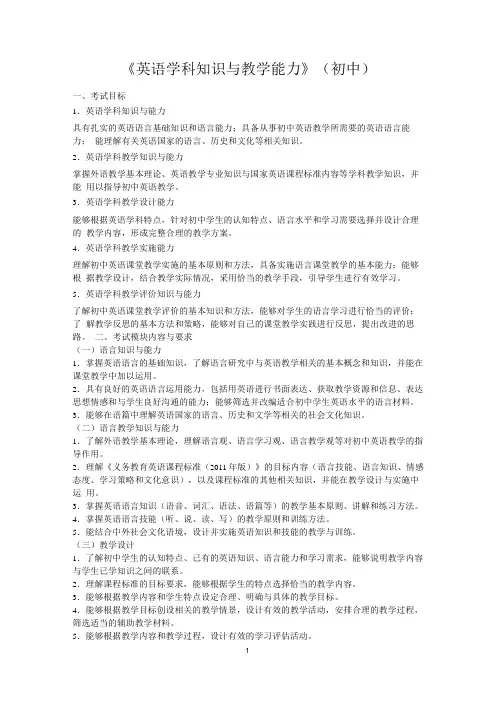
《英语学科知识与教学能力》(初中)一、考试目标1.英语学科知识与能力具有扎实的英语语言基础知识和语言能力;具备从事初中英语教学所需要的英语语言能力;能理解有关英语国家的语言、历史和文化等相关知识。
2.英语学科教学知识与能力掌握外语教学基本理论、英语教学专业知识与国家英语课程标准内容等学科教学知识,并能用以指导初中英语教学。
3.英语学科教学设计能力能够根据英语学科特点,针对初中学生的认知特点、语言水平和学习需要选择并设计合理的教学内容,形成完整合理的教学方案。
4.英语学科教学实施能力理解初中英语课堂教学实施的基本原则和方法,具备实施语言课堂教学的基本能力;能够根据教学设计,结合教学实际情况,采用恰当的教学手段,引导学生进行有效学习。
5.英语学科教学评价知识与能力了解初中英语课堂教学评价的基本知识和方法,能够对学生的语言学习进行恰当的评价;了解教学反思的基本方法和策略,能够对自己的课堂教学实践进行反思,提出改进的思路。
二、考试模块内容与要求(一)语言知识与能力1.掌握英语语言的基础知识,了解语言研究中与英语教学相关的基本概念和知识,并能在课堂教学中加以运用。
2.具有良好的英语语言运用能力,包括用英语进行书面表达、获取教学资源和信息、表达思想情感和与学生良好沟通的能力;能够筛选并改编适合初中学生英语水平的语言材料。
3.能够在语篇中理解英语国家的语言、历史和文学等相关的社会文化知识。
(二)语言教学知识与能力1.了解外语教学基本理论,理解语言观、语言学习观、语言教学观等对初中英语教学的指导作用。
2.理解《义务教育英语课程标准(2011年版)》的目标内容(语言技能、语言知识、情感态度、学习策略和文化意识),以及课程标准的其他相关知识,并能在教学设计与实施中运用。
3.掌握英语语言知识(语音、词汇、语法、语篇等)的教学基本原则、讲解和练习方法。
4.掌握英语语言技能(听、说、读、写)的教学原则和训练方法。
5.能结合中外社会文化语境,设计并实施英语知识和技能的教学与训练。
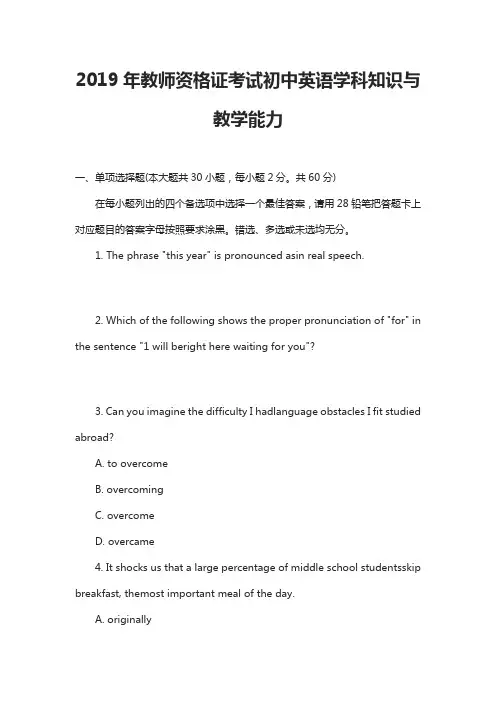
2019年教师资格证考试初中英语学科知识与教学能力一、单项选择题(本大题共30小题,每小题2分。
共60分)在每小题列出的四个备选项中选择一个最佳答案,请用28铅笔把答题卡上对应题目的答案字母按照要求涂黑。
错选、多选或未选均无分。
1. The phrase "this year" is pronounced asin real speech.2. Which of the following shows the proper pronunciation of "for" in the sentence "1 will beright here waiting for you"?3. Can you imagine the difficulty I hadlanguage obstacles I fit studied abroad?A. to overcomeB. overcomingC. overcomeD. overcame4. It shocks us that a large percentage of middle school studentsskip breakfast, themost important meal of the day.A. originallyB. namelyC. regularlyD. obviously5. The author and photographer_________coming to our university to give a lecture next Friday.A. wasB. isC. wereD. are6. Only when the CIA Director David was forced to resignthat it's hard to keep our e-mail secret.A. we realizedB. realized weC. did we realizeD. we did realize7. It was March 5,2013president Hugo cost his last fight in life at the age of 58.A. thatB. whenC. sinceD. while8. --I was disappointed that you didn't come to my party last night.--I wish_________occupied then.A. I'm notB. I wasn'tC. I haven't beenD. I hadn't been9. What type of sentence is "Tom likes apples, but Tim likes pears."?A. A simple sentence.B. A coordinate sentence.C. A complex sentence.D. None of the above.10. The ambiguity in "My friend drove me to the bcmk." is caused byA. lexical itemsB. a grammatical structureC. homonymyD. polysemy11. Which of the following is a communicative activity?A. Listening to the news report and talking about an event.B. Listening to the news report and filling in a form.C. Listening to the news report and writing the main idea.D. Transferring the information from the news report into a chart.12. Teachers who believe in the_________ model will enable students to understand themeaning and usage of the words first, and then makefull use of the words iu listeniug, reading orwriting tasks, ask representatives to show products of the tasks, and give an evaluation her it at lastwhen teaching vocabulary.A. PPPB. PWPC. PPTD. TBLT13._________ is a type of activity in which the teacher reads out a passage in normal speed for two or three times and students are to note down the words they could catch as they listen asmuch as possible.A. Answering questions.B. Gap-filling.C. Dictogloss.D. Sequencing.14. There are some speaking activities. Which of the following mainly focuses on the form andaccuracy?A. Controlled activities.B. Semi-controlled activities.C. Communicative activities.D. Problem-solving activities.15. When a teacher asks the students to find some key words from a text quickly, be/she areintended to train students'_________ strategy in reading class.A. skimmingB. scanningC. extensive readingD. intensive reading16. Which of the following is NOT among the features of process writing?A. Help students to understand their own composing process.B. Let students discover what they want to say as they write.C. Encourage feedback both from the teacher and peers.D. Emphasize the form rather than the content.17. What's the teacher doing by saying "Who wants to have a try"?A. Controlling discipline.B. Giving prompt.C. Evaluating students' work.D. Directing students' attention to the lesson.18. Which of the following is NOT the advantage of group work?A. Creating some peaceful and quiet time in class.B. Arousing their awareness of cooperation.C. Promoting students' participation in the class.D. Encouraging different opinions and contributions to the work.19. What is the teacher doing in terms of error correction?S: I go to the theatre last night.T: You go to the theatre last night?A. Correcting the student's mistake.B. Hinting that there is a mistake.C. Encouraging peer correction.D..Asking the student whether he really went to the theatre.20. Which one does not belong to subjective questions in the following English tests?A. Writing.B. Oral test.C. Translation.D. Cloze.请阅读Passage l,完成第21-25小题。
注意事项:1.考试时间为l20分钟;满分为l50分..2.请按规定在答题卡上填涂、作答..在试卷上作答无效;不予评分..一、单项选择题本大题共30小题;每小题2分;共60分在每小题列出的四个备选项中选择一个最佳答案..请用28铅笔把答题卡上对应题目的答案字母按照要求涂黑..错选、多选或未选均无分..1. Which of the following shows the proper pronunciation of the segment"did you" in connected speech2. How many liaisons of sound are there in the sentence "Tell us all about it"A. oneB. twoC. threeD. four3. The shy girl felt__________ and uncomfortable when she could not answer her teacher's questions.A. amazedB. awkwardC. curiousD. amused4. Most people on this island are recreational fishers; and __________ ; fishing forms an actual part of their leisure time.A. accidentallyB. purposefullyC. obviouslyD. formally5. The Government is anxious to keep the whole __________ out of court.A. exampleB. instanceC. caseD. sample6. Many a boy__________playing basketball.A. likesB. likeC. to likeD. have like7. Nobody but the twins__________some interest in the project till now.A. showsB. showC. have shownD. has shown8. Now that we've discussed our problem; are people happy with the decisions__________A. takingB. takeC. takenD. to take9. Which of the following is a slip of tongueA. No cross; no crown.B. No pains; no gains.C. No sweat without sweet.D. No smoke without fire.10. The phenomenon that words having different meanings have the same form is called__________.A. hyponymyB. synonymyC. polysemyD. homonymy11. Think about when a teacher handed out a list of twenty"Past tense"sentences and asked students to discussand find out the grammatical structures.What is the teacher's grammar teaching methodA. Induction.B. Presentation.C. Consolidation.D. Deduction.12. Which of the following is a suitable pre-listening activityA. Writing a similar text.B. Discussing a relevant picture.C. Writing all the main knowledge about the topic.D. Do some exercises about the difficult vocabulary with the topic.13. There are five components of communicative competence. Which of them refers to one's ability to create coherent written text or conversation and the ability to understand themA. linguistic competenceB. pragmatic competenceC. discourse competenceD. strategic competence14. What is the teacher doing in terms of error correctionS: I go to the theatre last night.T: You go to the theatre last nightA. Correcting the student's mistake.B. Hinting that there is a mistake.C. Encouraging peer correction.D. Asking the student whether he really went to the theatre.15. Which of the following questions can be used in the questionnaire for assessing participationA. Did you get all the questions right in today's classB. Did you finish the task on timeC. Can you use the strategies we have learned todayD. What did you do in your group work today16. Questioning plays an important role for the classroom teaching. Which of the following questions does not belong to comprehension questionsA. What is the main idea of this paragraphB. Can you tell the difference between the two termsC. Can you retell the text we have learned last weekD. Can you paraphrase the sentence in your own words17. What's the teacher doing by saying "Who wants to have a try"A. Controlling discipline.B. Giving prompt.C. Evaluating students' work.D. Directing students' attention to the lesson.18. Which of the following is not an interactive activityA. Looking at the picture below and discussing the questions with your partner.B. Listening to the tape again and retelling the story with the filled chart.C. Discussing the following questions in group.D. Asking another group to give you some advice on improving your work.19. Which of the following activities is the best for training detailed reading A. Drawing a diagram to show the text structure.B. Giving the text an appropriate title.C. Transforming information from the text to a diagram.D. Finding out all the unfamiliar words.20. In PPP method classes or sequences; the teacher presents the context and situation for the language; and both explains and demonstrates the meaning and form of the new language. The students then practice making sentences before going on to another stage in which they talk or write more freely. PPP stands for except__________.A. PresentationB. ProceduresC. ProductionD. Practice请阅读Passage 1;完成第21~25小题..Passage 1It is generally agreed that the first true cities appeared about 5;000 years ago in the food-producing communities of the Middle East. The cities of Sumeria; Egypt and the Indus Valley possessed a number of characteristics that distinguished them as truly urban. The cities were very much larger and more densely populated than any previous settlement; and their function wasclearly differentiated from that of the surrounding villages. In the cities the old patterns of kinship relations were replaced by a complex hierarchy of social classes based on the specialization oflabor. Moreover; the need to keep records led to the development of writing and arithmetic; and the increased sophistication of urban society gave a new impetus to artistic expression of every kind.When the basis of city life was established in Europe the urban tradition was drawn from the ancient cities of the Middle East; via the civilization of Greece and Rome. We can trace threemain phases in the growth of the West European city. The first of these is the medieval phase which extends from the beginning of the 1 lth century A.D. to about 1;500 to the beginning of the 19th century. The third is the modern phase extending from the early 19th century to the present day.Every medieval city began as a small settlement; which grew up round a geographical or cultural focal point. This would be a permanent structure such as a stronghold; a cathedral or a large church. In districts where travel and trade were well established; it might be a market; a river crossing; or a place where two or more trade routes met; in studies of urban geography the oldest part of town is referred to as the nuclear settlement. There are many small towns in Europe where it is still possible to trace the outline of the original nuclear settlement. It is; of course;much more difficult to do this in the case if a large modern city which has grown to many times its original size.21. The ancient cities were characterized by all the following except__________.A. larger populationsB. different rolesC. different social classesD. different locations22. Which of the following statements is TRUEA. West European cities established their own urban traditions.B. West European cities grew directly out of those in the Middle East.C. Cities appeared earlier in the Middle East cities went through the same phases.D. West European and Middle East cities went through the same phases.23. Which of the following could be regarded as a geographical focal pointA. A local restaurant.B. A town hall.C. A local theatre.D. An open market.24. It is easier to locate its original nuclear settlement of a small town__________.A. because it began as a small settlementB. because it is less developedC. because of its small sizeD. because of its location25. Which of the following would be the best title of the passageA. The Origin and Development of Cities.B. The Differences Between a Modern City and an Ancient City.C. The Functions of a City.D. The Characteristics of an Ancient City.请阅读Passaqe 2;完成第26~30小题..Passage 2There are two factors which determine an individual's intelligence. The first is the sort of brain he is born with. Human brains differ considerably; some being more capable than others. But no matter how good a brain he has to begin with; an individual will have a low order of intelligence unless he has opportunities to learn. So the second factor is what happens to the individual--thesort of environment in which he is brought up. If an individual is handicapped environmentally; it is likely that his brain will fail to develop and he will never attain the level of intelligence of which he is capable.Theimportanceofenvironmentindetermininganindividual'sintelligencecanbedemonstrated by the case history of the identical twins; Peter and Mark. Being identical; the twins had identical brains at birth; and their growth processes were the same. When the twins were three months old; their parents died; and they were placed in separate foster homes. Peter was raised by parents of low intelligence in an isolated community with poor educational opportunities. Mark was reared in the home of well-to-do parents who had been to college. He was read to as a child; sent to good schools; and given every opportunity to be stimulated intellectually. This environmental difference continued until the twins were in their late teens; when they were given tests to measure their intelligence. Mark's LQ. was 125; twenty-five points higher than the average and fully forty points higher than his identical brother. Given equal opportunities; the twins; having identical brains; would have tested at roughly the same level.26. This selection can best be titled__________.A. Measuring Your IntelligenceB. Intelligence and EnvironmentC. The Case of Peter and MarkD. How the Brain Influences Intelligence27. The best statement of the main idea of this passage is that__________.A. human brains differ considerablyB. the brain a person is born with is important in determining his intelligenceC. environment is crucial in determining a person's intelligenceD. persons having identical brains will have roughly the same intelligence28. According to the passage; the average I.Q. is__________.A. 85B. 100C. 110D. 12529. The case history of the twins appears to support the conclusion that__________.A. individuals with identical brains seldom test at the same levelB. an individual's intelligence is determined only by his environmentC. lack of opportunity blocks the growth of intelligenceD. changes of environment produce changes in the structure of the brain30. This passage suggests that an individual's I.Q. __________.A. can be predicted at birthB. stays the same throughout his lifeC. can be increased by educationD. is determined by his childhood二、简答题本大题1小题;20分根据题目要求完成下列任务;用中文作答..31.什么是教学反思4分教学反思的注意事项有哪些6分请具体说明教学后反思阶段的内容..10分三、教学情境分析题本大题1小题;30分根据题目要求完成下列任务;用中文作答..32.以下是某堂课老师的教学材料:Betty: Hi Mum; can you hear meMum: Yes; I can. Where are youBetty : I' m standing on the Great Wall of China and talking to you.Mum: ReallyBetty: We're on a school trip and we've having lunch. And we're lying in the sun and we' re taking lots of photos.Mum: That's great; Betty. What are the others doingBetty: Well; Tony is eating an ice cream; and Lucy is buying some presents and postcards.And Tom is eating lunch and lying in the sun.Mum: Can you send me a post cardBetty: Yes. Lucy and I are writing postcards. We're enjoying the school trip a lot. Anyway;we're going home now. ByeMum: Bye bye; Betty任务要求:根据材料内容回答以下三个问题..1这份材料属于哪种语篇类型7分2这份材料适合于哪种课堂教学说明理由至少写出两个要点..8分3分析教师选用文本材料时需要考虑的基本要素至少写出三个要点..15分四、教学设计题本大题1小题;40分根据提供的信息和语言素材设计教学方案;用英文作答..33.设计任务:请阅读下面学生信息和语言素材;设计一节英语听说课的教学方案..教案没有固定格式;但须包含下列要点:teaching objectivesteaching contentskey and difficult pointsmajor steps and time allocationactivities and justifications教学时间:45分钟学生概况:某城镇普通中学九年级初中三年级学生;班级人数40人;多数已经达到义务教育英语课程标准2011版四级水平;学生课堂参与积极性一般..语言素材:一、单项选择题二、1.答案A..解析:考查发音规则..dj互相影响;即齿槽爆破浊辅音d与舌面浊辅音有摩擦的j互相妥协..三、2.答案D..解析:考查连读..liaison意为“连音”;当一个单词后面紧跟一个以元音开头的单词时;则该单词最后的原本不发音的辅音就发音;与元音连读..本句中Tell us;us all;all about和about it均为连音;故选D..四、3.答案B..解析:考查形容词辨析..句意为“当这个害羞的女孩回答不上来老师的提问时;她感到很__________和难受”..amazed意为“惊讶的”;awkward意为“窘迫的”;curious 意为“好奇的”.amused意为“消遗的..娱乐的”..根据句意.回答不出来问题;应该感到窘迫;故选B..五、4.答案C..解析:考查副词辨析..句意为“岛上大多数人都是娱乐性的渔夫.__________垂钓已经成为他们休闲生活的一部分..”accidentally“意外地;偶然地”;purposefully“自觉地;有目的地”;obviously“明显地;显然地”;formally“正式地;形式上地”..根据句意应是正常过渡;由前半句可知应用“很明显”连接后半句;故选C..六、5.答案C..解析:考查名词辨析..题中所给出的四个选项均有“例子;事例”之意..example普通用词;指能代表同类事物性质或一般规律的典型例子;instance多指用于说明、支持或反证一般事实或理论的事例;case多指需要加以认真研究的实例;如病例、案例等;sample通常指样品..句意为“政府迫切希望整件案子能在庭外解决”..此处表示正式的案件..故选C..七、6.答案A..解析:考查主谓一致..“many a/an+单数名词”表示的是“许多”;作主语时;谓语动词用单数形式..故选A..八、7.答案D..解析:考查时态和主谓一致..首先根据句意判断;应该用现在完成时;排除A、B..句子主语是nobody;谓语动词用单数形式;故选D..九、8.答案C..解析:考查非谓语动词..这里的decisions是take的宾语;具有动宾关系.因此用过去分词.作后置定语..句意是“既然我们已经讨论了我们的问题;人们对做出的决定满意吗”十、9.答案C..解析:考查英语口误问题..A项的意思是“不经历风雨;怎么见彩虹”;B项的意思是“不劳无获“;C项的正确表达应为“No sweet without sweat”;意为“苦尽甘来”;D 项的意思是“无风不起浪”根据题意可知.C项属于口误;故选C..十一、10.答案D..解析:考查语义学知识..homonymy指的是语汇中一对对或是一组组的单词;虽然意思不同;但是发音相同;或拼写相同;又或者是发音和拼写都相同..这些一对对一组组的单词我们称之为homonvm同形同音异义词/同形异义词/同音异义词..十二、11.答案A..解析:考查教学法辨析..题目问的是:一位老师列出了二十个与过去时相关的句子.然后请学生讨论并找出过去时的语法结构.这位老师使用了哪种语法教学方法;”语法教学的常用方法有两种演绎法和归纳法:A项的Induction是归纳法;D 项的Deduction是演绎法..本题中的教学方法很明显是归纳法..B项的新课展示和C项的巩固提高;都是教学环节;不是教学方法..因此选A项;、十三、12.答案B..解析:考查听力教学..题目问的是:“下列哪个活动是适合在听前环节活动中进行的”该题考察听力教学中的“听前环节”..听前环节主要包括准备活动;介绍相关背景知识;安排学生通过讨论相关图片.预测文章的内容或学习与该主题相关的词汇..但是A项在听前写相似的文章不合适:而C项“把所有关于文章的主要信息下来”这一活动和D项“做一些练习来突破相关活题的难词汇”的活动适合在while—listening环节做..十四、故选B..十五、13.答案 C..解析:考查交际能力..交际能力有五个主要组成部分:liguistic competence.pragmatic competence.discourse competence;strategic competence;fluency..其中题目中描述的是discourse competence话语能力..十六、14.答案B..解析:考查课堂纠错行为..教师是在暗示学生的话里有错误..十七、15.答案D..解析:考查调查问卷的提问方式..A、B、c三项均为选择性问题;只需回答“是”或“不是”:只有D项是开放性问题.能真正看出学生一天的学习情况..十八、16.答案C..解析:考查课堂提问类型..提问在课堂教学中发挥着重要的作用..课堂教学可以采用多种提问形式..题目中只有C项是回忆性提问;其他三项均是理解性提问..故选C..十九、17.答案B..解析:考查教学活动中教师的角色..教师在此充当课堂教学的推动者.. 二十、18.答案 B..解析:考查互动性活动..“再听一遍录音;并根据已经填好的表格复述听力文章的内容”;这一活动不属于互动性的活动..所以B项错误..二十一、19.答案C..解析:考查阅读训练活动..选项中训练细读的最好办法就是把原文中的信息做成表格..二十二、20.答案B..解析:考查3P教学法..题目问的是:PPP教学模式是教师先通过语境呈现并讲解语言点;后让学生经过反复、大量的操练后再达到自由运用表达的程度..PPP教学模式是什么PPP教学模式是“讲解presentation、操练practice、运用production”这一沿用已久的传统教学模式..在这种“标准”下;中国英语语法教学大体表现为以教师为中心、采取灌输教学法、运用题海战术..我们可以排除B选项..二十三、Passage l二十四、21.答案D..解析:根据题干关键词定位到第一段..第一段中的第三句和第四句分别提到了人口、不同的角色和不同的社会阶层..而文中始终没有提及不同的位置;故选D..二十五、22.答案C..解析:根据第二段的第一句可知;当欧洲城市生活的基础才刚刚开始的时候;中东的城市生活已经从古代城市文明中发展起来了..故选C..二十六、23.答案D..解析:根据题干关键词定位到第三段的第三句“In districts where travel and trade…as the nuclear settlement”;由此可知..市场也是一个很重要的地理标志..故选D..二十七、24.答案C..解析:根据题干关键词定位到第三段最后一句“It is;of course;much more difficult to do this…its original size”;由此可知;一个面积是原先面积很多倍的大型现代城市;是很难再探寻到其原始核心村落的概貌的..故可推断面积不大是容易探寻其原始核心村落的概貌的原因..故选C..二十八、25.答案D..解析:纵观全文可知本文通篇都在讲述古代城市的特点;因此D项“古代城市的特点”最适合作为本文的标题..故选D..二十九、Passage 2三十、26.答案B..解析:文章第一段提到有两个因素影响人的智力;即先天因素及后天的环境因素..之后提到了两者的关系;如果环境不利;大脑也不可能发展到相应的智力水平..第二段举例说明了环境对智力的影响..因此B项作为标题最恰当..三十一、27.答案C..解析:能够体现主旨的最好论述是C项;即环境在决定一个人智力高低上面起关键性作用..三十二、28.答案B..解析:根据第二段“Mark’s LQ.was l25;twenty-five points higher than the average”可知;平均智商是l00;选B..三十三、29.答案 C..解析:由最后一句“Given equal opportunities;the twins;having identical brains;would have tested at roughlv the same level.”可知答案为C;即缺乏机会能阻碍智力的发展..三十四、30.答案C..解析:通过例子可知;一对双胞胎的先天智力是相同的.但是由于受的教育不同;后天智商相差很多;由此可见教育可以提高智商;故选C..三十五、二、简答题三十六、31.参考答案三十七、1教学反思是教师为改进教学而对教学进行反思的行为;包括收集有关教学的数据;对自己的信念、态度、价值观、知识、假设、教学实践以及社会所给予的机会和限制进行批判性思考;从而寻求其他方法以更有效地达到目的和目标..三十八、2注意事项:三十九、①教学反思的内容要具体合理:反思要针对具体的教学环节与设计内容进行;不能过于笼统;也不能从观念与理论上做一些大而无当、空洞无物的说明;不应当套用特定的理论标准或使用过高的、不切实际的标准来反思自己的教学过程..四十、②教学反思的分析与表述要准确:要准确地说明所分析的对象;分析的逻辑要清晰明了;不要使用一些模糊的、自编的;或只是在小范围内熟知的、常用的套话或术语..四十一、③教学反思的要求要客观:要以改进教学效果、提高学生的学习效率为目标;不应当一味地拔高要求;或是无原则地自我批评..四十二、3教学后反思的内容:四十三、教学后反思围绕教学内容、教学过程、教学策略进行..具体为:四十四、①教学内容方面四十五、确定教学目标的适用性;对目标所采取的教学策略做出判断..四十六、②教学过程方面四十七、回忆教学是怎样进行的;对教学目标的反思:是否达到预期的教学效果;对教学理论的反思:是否符合教与学的基本规律;对学生的评价与反思:各类学生是否达到了预定目标;对执行教学计划情况的反思:改变计划的原因和方法是否有效;采用别的活动和方法是否更有效;对改进措施的反思:教学计划怎样修改会更有效..四十八、③教学策略方面四十九、感知环节:教师要意识到教学中存在的问题与自己密切相关;理解环节:教师要对自己的教学活动与倡导的理论;行为结果与期望进行比较;明确问题根源;重组环节:教师要重审教学思想;寻求新策略;验证环节:检验新思想、新策略、新方案是否更有效;形成新感知;发现新问题;开始新循环..五十、三、教学情境分析题五十一、32.参考答案五十二、1语篇指的是实际使用的语言单位;是一次交际过程中的一系列连续的话段或句子所构成的语言整体..五十三、根据韩礼德的观点;语篇是一个语义单位或意义潜势的现实化;任何一个口头或书面语言片段..不论其长短;只要能构成一个语义整体;即表达完整的意思;就可以称之为语篇..根据语篇的概念;该材料属于会话语篇..五十四、2这份材料适合于口语教学..五十五、理由:五十六、①材料语言比较简单;没有生僻词汇;句式偏向口语化;适合用于口语练习;五十七、②选材偏向生活化;有生活气息.适合平时与人交际使用;英语口语的最终目的就是让学生达到沟通交流;因此会话语篇可以提供这样一个交流的环境..五十八、⑧材料以对话形式呈现有问有答;也有连读和吞音部分;对于语音语调的学习都是很好的内容..五十九、3考虑要素:六十、①教学内容要素:教学内容是要完成的教学任务;是实现教学目标的主要载体..因此教师在选择材料时;将教科书作为主要依据;教材分析基本关注教学的重点、难点及考点方面..比较注重显性教材的运用而忽视隐性教材的挖掘和利用;较少关注与学习教材内容有密切关系的认知和心理因素..以及教材对学生能力的要求;而对教学的重点和难点也只是阐述其内容;没有做进一步的分析..在新课改背景下;教学内容分析既要求对显性教材的运用;也要求对隐性教材的挖掘和利用..六十一、②教学对象要素:学生是分析教学任务必须要考虑的因素..分析学生是为了帮助学生解决学习中的困难;完成教学任务..教师应该做到以下两点:一是要了解教学活动开始前学生在认知、情感、态度等方面已经达到了什么样的水平;这一水平标志着学生已经能做什么;说什么;想明白了什么等等即学生的学历和学情..这是学生掌握新的学习任务的起点水平..二是要了解教授了教学材料后预期学生在认知、情感、态度等方面必须达到的状态..对这种状态的把握最终会转化为确定的教学任务与具体的学习目标..只有当教师的心中对教学前和教学后这两种状态的差距做到心中有数时;才能根据学生的实际情况;确定恰当的教学内容..六十二、③教学目标要素:教学目标是教育者在教学过程中;希望受教育者达到的要求或产生的变化结果;也是教师完成教学任务的归宿..新课程标准从关注学生的学习出发;强调学生是学习的主体;教学目标是教学活动中师生共同追求的;而不是由教师所操纵的..因此;教学目标的主体显然应该是学生..教师在选择教学材料的同时也要以学生为出发点;思考需要完成怎样的教学目标或达到怎样的教学效果..六十三、四、教学设计题六十四、33.参考设计六十五、Teaching Content: This lesson contains some new words; phrases; and sentence patterns ot going on vacation.六十六、It will help students to express their past events.六十七、Teaching Objectives ..六十八、 1 Knowledge objective六十九、Students could learn some new phrases and sentence patterns of vacation.七十、 2 Ability objective七十一、Students could talk about their activities during vacation.七十二、 3 Emotional objective七十三、Students could enhance friendship during the class by talking about common interests.七十四、Teaching Key Point:七十五、New phrases and sentence patterns about vacation七十六、Teaching Difficult Points:七十七、How to get the students to talk about the topic actively.七十八、Teaching Aids :七十九、Multimedia; word cards; some related pictures八十、Teaching Procedures :八十一、Step 1 Leading in and Warming up 5 minutes八十二、Greet with students and the teacher will share his / her own story about his / her vacation.八十三、Justifications: It can attract students' interests to learn this lesson.八十四、Step 2 Pre-reading 10 minutes八十五、The teacher will play a video of travelling during vacation. Students review some phrases about going on vacation. Teacher asks "What did you do on your vacation " to enlighten students on talking about their experience.八十六、Justifications: Playing a video can lead in new class. The form of brainstorming is conducive to students'statements. It also paves the next step.八十七、Step 3 Phrases study 10 minutes八十八、Activity 1 : Make use of pictures on Page 1 to predict learning content and learn phrases"went to the beach""visited the museumsstayed at home"; etc.八十九、Activity 2: Students should do exercise in the textbook la; lb.九十、Activity 3 : Students will do some added exercise of vocabulary by listening to the tape. 九十一、Justifications: Students will understand the meanings of new vocabulary andpictures. Exercise from la helps students memorize new content. Listening exercise from lb will recall the key phases to students.九十二、Step 4 Practice 5 minutes九十三、Activity 1 : Students will look at pictures on Page 2 and answer two questions.九十四、Activity 2: Students should complete listening exercise from 2a and 2b.九十五、Justifications: Pictures help students understand listening content better. Exercise from 2a and 2b helps students know what it talks about.九十六、Step 5 Pair work 10 minutes九十七、Three students will work in a group and play conversation practice by imitating Grace; Kevin and Julie according to materials of 2a and 2b.九十八、Justifications: This part helps students consolidate new words and sentence patterns and imitate pronunciation of listening material.九十九、Step 6 Summary and Homework 5 minutes百、Summary: Students will recall what they have learned today. The teacher can repeat them. 百一、Homework: Students will prepare a speech on the topic "The most unforgettable thing during my vacation" after class and speak it out on the next class.百二、Justification: They can help students to consolidate the knowledge what they have learned on the class.百三、Blackboard Design :百四、New sentence patterns:百五、Where did Tina go on vacation百六、She went to the mountains.百七、New phrases :百八、went to the beach百九、visited the museums百十、staved at home。
2019年上半年教师资格考试 (初中英语)学科知识与教学能力试题1、Whichofthefollowingwordshasastresspatterndifferentfromtherest? A 、prepare B 、technique C 、obvious D 、advice 试题答案:C2、WhichofthefollowingunderlinedwordswillbestressedwhenJuliarespondstothepersonwhohasmistakenherforJulian?A 、 MyiiQin 亡isJulia,noiJuliJin,B 、 MynameisJulia,notJulian.C 、MynameisJulia,notJulian, D 、 MyiKiincisJulin.naiJulion.试题答案:B 3、Theword“UNESCO”iscalleda(n)(). A 、acronym B 、blend C 、clippedword D 、coinedword 试题答案:A4、HelookslikeaScottish,buthisaccentmaygivehim().A 、offB 、outC 、inD 、awayA 、 atB 、i n C 、b y D 、 to5、试题答案:’DThebookissowellreceivedthatitsells()themillion. 试题答案:c6、()wearesuccessful,wecanbesurethatwedidourbest.A 、ProvidedthatB 、IfonlyC 、IfornotD 、Whetherornot试题答案:d7、—Willyoubeabletogoswimmingwithus?—().A 、I'mafraidnotB 、I'mafraidC 、I'mnotafraidD 、I'mnotafraidso试题答案:a8、()isthecustom,theinvestigatorscarriedoutapainstakingsearchofthedebrisaftertheaircras h.A 、WhatB 、AsC 、WhichD 、That试题答案:b9、Therearedifferentwordsforpaternalgrandmother(nainai)andmaternalgrandmother(wai po)inChinese,butinEnglishtheword“grandmother”isgenerallyusedinbothcases,whichsu ggeststhat().A、equalimportanceisgiventomaternalandpaternalgrandparentsinChinaB、equalimportanceisgiventomaternalandpaternalgrandparentsinBritainC、languagemayinfluencepeople'swaysofthinkingtoalargeextentD、peopleofdifferentlanguagescategorizethingsindifferentways试题答案:d10、Whichofthefollowingisemployedbyaspeakerwhoaddressesseniorpeopleas“theelderly”r ath erthan“theold”?A、Socialdialect.B、Taboo.C、Linguafranca.D、Euphemism.试题答案:d11、Byaskingthequestion,“CanyoulistyourfavoritefoodinEnglish?”,theteacherisusingthetech niqueof().A、elicitationB、monitoringC、promptingD、recasting试题答案:a12、Ifateacherwantstocheckhowmuchstudentshavelearnedattheendofaterm,he/shewould givethema(n)().A、d iagnostictestB、placementtestC、proficiencytestD、a chievementtest试题答案:d13、WhatlearningstyledoesXiaoLiexhibitifshetriestounderstandeverysinglewordwhenlisteni ngtoapassage?A、Field-dependence.B、IntoleranceofAmbiguity.C、Risk-taking.D、Field-independence.试题答案:b14、Ifateacherasksstudentstoputjumbledsentencesinorderinareadingclass,he/sheintendsto developtheirabilityof().A、word-guessingthroughcontextB、summarizingthemainideaC、understandingtextualcoherenceD、scanningfordetailedinformation试题答案:c15、Whenateachersays“Whatdoyoumeanbythat?”,he/sheisaskingthestudentfor().A、repetitionB、suggestionC、introductionD、clarification试题答案:d16、Whenateachersays“You'dbettertalkinamorepolitewaywhenspeakingtotheelderly.”,he/ sheisdrawingthestudents'attentiontotheoflanguageuse().A、fluencyB、complexityC、accuracyD、appropriacy试题答案:d17、Whichofthefollowingisadisplayquestion?A、Whatpartofspeechis“immense”?B、Howwouldyoucommentonthisreport?C、WhydoyouthinkHemingwayisagoodwriter?D、Whatdoyouthinkofthecharactersinthisnovel?试题答案:a18、Which ofthefollowingrepresentsacontextualizedwayofpractising“Howoften...”?A、Makesomesentenceswith“howoften”.B、Use“howoften"andthewordsgiventomakeasentence.C、Igoshoppingtwiceaweek.Howoftendoyougoshopping?D、Pleasechangethestatementintoaquestionwith“howoften”.试题答案:c19、WhichofthefollowingarecontrolledactivitiesinanEnglishclass?A、Reporting,role-playandgames.B、Readingaloud,dictationandtranslation.C、Role-play,problemsolvinganddiscussion.D、Informationexchange,narrationandinterview.试题答案:b20、The()isdesignedaccordingtothemorphologicalandsyntacticaspectsofalanguage.A、structuralsyllabusB、situationalsyllabusC、skill-basedsyllabusD、content-basedsyllabus试题答案:a阅读理解Thebrainistrulyamarvel.Aseeminglyendlesslibrary,whoseshelveshouseourmostpre ciousmemoriesaswellasourlifetime'sknowledge.Butisthereapointwhereitreachescapaci ty?Inotherwords,canthebrainbe“full”?Theanswerisaresoundingno,because,well,brainsaremoresophisticatedthanthat.As tudypublishedinNatureNeuroscienceearlierthisyearshowsthatinsteadofjustcrowdingin, oldinformationissometimespushedoutofthebrainfornewmemoriestoform.Previousbehavioralstudieshaveshownthatlearningnewinformationcanleadtoforge tting.Butinthisstudy,researchersusednewneuroimagingtechniquestodemonstrateforth efirsttimehowthiseffectoccursinthebrain.Thepaper'sauthorssetouttoinvestigatewhathappensinthebrainwhenwetrytoreme mberinformationthat'sverysimilartowhatwealreadyknow.Thisisimportantbecausesimil arinformationismorelikelytointerferewithexistingknowledge,andit'sthestuffthatcrowds withoutbeinguseful.Todothis,theyexaminedhowbrainactivitychangeswhenwetrytoremembera“target”memory,thatis,whenwetrytorecallsomethingveryspecific,atthesametimeastryingtorem embersometh ingsimilar(a“competing”memory).Participantsweretaughttoassociateasi ngleword(say,thewordsand)withtwodifferentimages—suchasoneofMarilynMonroeand theotherofahat.Theyfoundthatasthetargetmemorywasrecalledmoreoften,brainactivityforitincreas ed.Meanwhile,brainactivityforthecompetingmemorysimultaneouslyweakened.Thischa ngewasmostprominentinregionsnearthefrontofthebrain,suchastheprefrontalcortex,rat herthankeymemorystructuresinthemiddleofthebrain,suchasthehippocampus,whichistr aditionallyassociatedwithmemoryloss.Theprefrontalcortexisinvolvedinarangeofcomplexcognitiveprocesses,suchasplanni ng,decisionmaking,andselectiveretrievalofmemory.Extensiveresearchshowsthispartoft hebrainworksincombinationwiththehippocampustoretrievespecificmemories.Ifthehippocampusisthesearchengine,theprefrontalcortexisthefilterdeterminingwh ichmemoryisthemostrelevant.Thissuggeststhatstoringinformationaloneisnotenoughfor agoodmemory.Thebrainalsoneedstobeabletoaccesstherelevantinformationwithoutbei ngdistractedbysimilarcompetingpiecesofinformation.Indailylife,forgettingactuallyhasclearadvantages.Imagine,forinstance,thatyoulosty ourbankcard.Thenewcardyoureceivewillcomewithanewpersonalidentificationnumber( PIN).ResearchinthisfieldsuggeststhateachtimeyourememberthenewPIN,yougraduallyfo rgettheoldone.Thisprocessimprovesaccesstorelevantinformation,withoutoldmemoriesi nterfering.Whenweacquirenewinformation,thebrainautomaticallytriestoincorporateitwithin existinginformationbyformingassociations.Andwhenweretrieveinformation,boththedes iredandassociatedbutirrelevantinformationisrecalled.Themajorityofpreviousresearchhasfocusedonhowwelearnandremembernewinfor mation.Butcurrentstudiesarebeginningtoplacegreateremphasisontheconditionsunder whichweforget,asitsimportancebeginstobemoreappreciated.21、Whichofthefollowingisclosestinmeaningtotheunderlinedword“resounding”inParagraph 2?A、Definite.B、Repetitive.C、Echoing.D、Impressive.22、Accordingtothepassage,whycan'tourbrainbe“full”?A、Itcanforgetwhatwewanttoremember.B、Itcanmemorizewhatwewanttoremember.C、Itcanstorelimitlessinformationlikealibrary.D、Itforgetstheoldinformationwhileabsorbingthenew.23、Accordingtothepassage,whichpartofourbrainistraditionallyconsideredtobefundamental totheformationofnewmemories?A、Thefrontalcortex.B、Themiddleofthebrain.C、Theprefrontalcortex.D、Thebackpartofthebrain.24、Whatisthemainpurposeofwritingthisarticle?A、Tointerpretwhyourmemorylossoccurs.B、Toelaboratehowweretrievespecificmemories.C、Toexplainwhyourmemorycapacityseemstobelimitless.D、Topresentthebalancebetweenrememberingandforgetting.25、Whichofthefollowingislikelytobediscussedinthesubsequentstudy?A、Theinfluenceofmemory.B、Theconditionsrelatedtoforgetting.C、Thewaysusedtopreventforgetting.D、Thefactorsinvolvedinmemoryformation.试题答案:[['A'],['D'],['B'],['C'],['B']]FormostAmericankids,itwouldn'tbeHalloweenwithouttrick-or-treatingforcandy;ho wever,thatwasn'talwaysthecase.Whenthecustomoftrick-or-treatingstartedinthe1930sa ndearly1940s,childrenweregiveneverythingfromhomemadecookiesandpiecesofcaketof ruit,nuts,coinsandtoys.Inthe1950s,candymanufacturersbegantogetinontheactandprom otetheirproductsforHalloween,andastrick-or-treatingbecamemorepopular,candywasin creasinglyregardedasanaffordable,convenientoffering.Itwasn'tuntilthe1970s,though,th atwrapped,factory-madecandywasviewedastheonlyacceptablethingtohandouttoallthel ittleghostsandgoblinsthatshoweduponpeople'sdoorsteps.Akeyreasonforthiswassafety, asparentsfearedthatreal-lifeboogeymenmighttamperwithgoodiesthatweren'tstore-bou ghtandsealed.Today,whenitcomestoHalloweencandy,anumberofthemostpopularbrandsareendu ringclassics.Forexample,thefirstHershey'sMilkChocolatebarwasproducedin1900andHer shey'panyfounderMiltonHersheywasapioneerinthe mass-productionofmilkchocolateandturnedwhatpreviouslyhadbeenaluxuryitemforthe well-to-dointosomethingaffordableforaverageAmericans.Intheearly1900s,healsobuilta nentiretown,Hershey,Pennsylvania,aroundhischocolatefactory.In1917,HarryBurnettReesemovedtoHershey,wherehewasadairymanforthechocolatecompanyandlaterworkeda titsfactory.InspiredbyMiltonHershey'ssuccess,Reese,whoeventuallyhad16children,bega nmakingcandiesinhisbasement.Inthemid-1920s,hebuiltafactoryofhisownandproduceda nassortmentofcandies,includingpeanutbuttercups,whichheinventedin1928andmadewi thHershey'schocolate.DuringWorldWarII,ashortageofingredientsledReesetopulltheplug onhisothercandiesandfocusonhismostpopularproduct,peanutbuttcups.In1963,Hershey acquiredtheH.BReeseCandyCompany.In1923,astruggling,Minnesota-borncandymaker,FrankMars,launchedtheMilkyWay bar,whichbecameabest-seller.In1930,heintroducedtheSnickersbar,reportedlynamedfor hisfavoritehorse,followedin1932bythe3Musketeersbar.Frank'ssonForresteventuallyjoi nedthecompany,onlytoleaveafterafallingoutwithhisfather.ForrestMarsrelocatedtoEngl and,wherehecreatedtheMarsbarintheearly1930s.In1941,helaunchedM&Ms.Marsantici patedthatWorldWarIIwouldproduceacocoashortage,sohepartneredwithBruceMurrie,s onofaHersheyexecutive,inordertohaveaccesstoasufficientsupplyofingredients;thecandy'sna mestandsforMarsandMurrie.Anothercrowd-pleasingHalloweencandy,theKitKatbar,wasfirstsoldinEnglandin193 5asaRowntree'sChocolateCrispandin1937wasrechristenedtheKitKatChocolateCrisp.The nameissaidtobederivedfromaLondonliteraryandpoliticalgroup,theKit-Cat(orKitKat)club, establishedinthelate17thcentury.Thegroup'smonikeristhoughttobeanabbreviationofth enameofthemanwhoownedtheshopwherethegrouporiginallygathered.Since1988,thebr andhasbeenownedbyNestle,makerofanotherperennialtrick-or-treatfavorite,theNestleC runchbar,whichdebutedinthelate1930s. WhatarethemainfeaturesofHalloweencandyinthe1970s?A、Safe,wrappedandfactory-made.B、Original,homemadeandexpensive.C、Delicious,manufacturedandexpensive.D、Convenient,homemadeandinexpensive.Whodoestheunderlinedword“boogeymen”inParagraph1referto?A、Evilspiritshauntingkids.B、Peoplewithevilintentions.C、KidsinHalloweencostumes.D、Candymakersandstorekeepers.WhichofthefollowingcorrectlydescribesMiltonHershey?A、Hemass-producedmilkchocolatebarsforthewealthy.B、HeduplicatedthebrandofHershey'sKissesin1907forHalloween.C、HeemployedHarryBurnettReesewholaterfoundedhisowncompany.D、HeencouragedForrestMarsandBruceMurrietojointlyproduceM&Ms.Howwasthename“KitKatChocolateCrisp”derived?A、ItwasrenamedbyNestle,anothermakeroftheHalloweencandies.B、ItwasborrowedfromthenameofRowntree'sChocolateCrisp.C、ItwasnamedafteraLondonliteraryandpoliticalgroup.D、Itwasabbreviatedfromthenameofashopowner.Whatisthepassagemainlyabout?A、ThenamesandbrandsofHalloweencandies.B、TheoriginandhistoryofHalloweencandies.C、ThepopularityandfameofHalloweencandies.D、TheconsumersandmanufacturersofHalloweencandies.试题答案:[['A'],['B'],['C'],['C'],['B']]23、根据题目要求完成下列任务,用中文作答。
2019年上半年中小学教师资格考试《英语学科知识与教学能力》(初级中学)注意事项:1.考试时间120分钟,满分150分。
2.请按规定在答题卡上填涂、作答。
在试卷上作答无效,不予评分。
一、单项选择题(本大题共30小题,每小题2分,共60分)在每小题列出的四个备选项中选择一个最佳答案,请用2B铅笔把答题卡上对应题目的答案字母按要求涂黑。
错选、多选或未选均无分。
1.Which of the following words has a stress pattern different from the rest?A.prepareB.techniqueC.obviousD.advice1.【答案】C。
解析:本题考查单词的重音位置。
题干:下面哪个单词的重音模式与其他单词不同?A、B、D三项的重音位置均在第二个音节上,只有C项的重音在第一个音节上。
故本题选C。
2.Which of the following underlined words will be stressed when Julia responds to the person who has mistaken her for Julian?A.My name is Julia, not Julian.B.My name is Julia, not Julian.C.My name is Julia, not Julian.D.My name is Julia, not Julian.2.【答案】B。
解析:本题考查句子的重音。
因为Julia想纠正跟她对话的那个人对她名字的误读,名字是“Julia”而不是“Julian”,所以此处应该把正确的名字“Julia”重读。
故本题选B。
3.The word “UNESCO” is called a(n)______.A.acronymB.blendC.clipped wordD.coined word3.【答案】A。
一、单项选择题本大题共30小题;每小题2分;共60分二、1.Those robots can walk like__________.三、A.human四、B.humans五、C.humen六、D.humens七、2.She with her friends__________to visit their teacher everyweek.八、A.go九、B.going十、C.goes十一、D.went十二、3.I don’t think the poor__________always poor.Working hard__________very important.十三、A.is;is十四、B.are;are十五、C.are;is十六、D.is;are十七、4.Would you mind__________the window十八、A.I closing十九、B.my closing二十、C.me closing二十一、D.me close二十二、5.It has been__________since we went out to play last time.二十三、A.some time二十四、B.sometime二十五、C.sometimes二十六、D.some times二十七、6.Mr.Green works in a__________building.二十八、A.thirty stories high二十九、B.thirty-stories high三十、C.thirty-stories-high三十一、D.thirty-story high三十二、7.Many children would__________watch TV than do sports.三十三、A.rather三十四、B.1ike三十五、C.want三十六、D.love三十七、8.It’S very nice__________you__________my parents your best wishes.三十八、A.of;sending三十九、B.of;to send四十、C.for;to send四十一、D.for;sending四十二、9.If you want to go to the movie tonight;S__________I.四十三、A.do四十四、B.am四十五、C.will四十六、D.should四十七、10.The United Kingdom is a constitutional monarchy.The__________has very little power.四十八、A.queen四十九、B.monarch五十、C.prime minister五十一、D.king五十二、11.Which of the following words contains a triphthong 五十三、A.low五十四、B.tower五十五、C.boy五十六、D.year五十七、12./m/;/n/are__________.五十八、A.fricatives五十九、B.dentals六十、C.glides六十一、D.nasals六十二、13.Textbook writing should comply with principles of interest;flexibility and openness;develop-ment and expansibility;science and__________.六十三、A.practicality六十四、B.energy-efficiency六十五、C.effectiveness六十六、D.thought六十七、14.Which of the following statements does not belong to teaching activities六十八、A.Survey and interview.六十九、B.Planning text structure.七十、C.Impromptu speaking and discussion.七十一、D.Cooperative learnin9.七十二、15.Total Physical Response Method belongs to the comprehension approach which especially em-phasis on the understanding of__________.Teachers give instructions in foreign language;students need to use body movements to respond to the teachers.七十三、A.1istening七十四、B.speaking七十五、C.reading七十六、D.writing七十七、 1 6.__________is generally considered that far from the linguistic context of target language whose language system is different from source language’S.七十八、A.Second Language Teaching七十九、B.Foreign Language Teaching八十、Cmon Language Teaching八十一、D.Native Language Teaching八十二、17.Hymes believes that English communicative skills contain grammatical competence;__________;discourse competence and strategic competence.八十三、A.social and cultural awareness八十四、B.social behavior八十五、C.social awareness八十六、D.social experience八十七、18.The implication of Language Input Theory gives to foreign language teaching is that language teaching should firstly pay attention to_________.八十八、A.a certain amount of language input八十九、B.1anguage sign九十、C.1inguistic meaning九十一、D.1anguage use九十二、19.English learning strategies do NOT include__________.九十三、A.cognitive strategy九十四、B.control strategy九十五、Cmunication strategy九十六、D.test-taking strategy九十七、20.Teachers should actively use a variety of teaching resources;__________;and design teaching process which is suitable for the development of students.九十八、A.teach with textbooks reasonably九十九、B.use textbooks flexibly and creatively百、C.use textbooks as required百一、D.use textbooks step by step百二、请阅读Passage One;完成第21—25小题..百三、Passage One百四、Years ago;I lived in a building in a large city.The buildin9’S next door was only a few feetaway from mine.There was a woman who lived there;whom I had never met;yet I could see her seated by her window each afternoon;sewing or readin9.After several months had gone by;I beganto notice that her window was dirty.Everything was unclear through the dirty window.1 would say tomyself:“l wonder why that wonlan doesn’t wash her window.It really looks terrible.”百五、One bright morning I decided to clean my flat.includingwashing the window on the inside.Late in the afternoon when I finished the cleanin9.I sat down by the window with a cup of cof-fee for a rest.What a surpriseAcross the way;the woman sitting by her window was clearly visi-ble.Her window was clean 百六、Then it dawned on me.I had been criticizing批评her dirty window;but all the time l waswatching hers through my own dirty window.百七、That was quite an important lesson for me.How often had I looked at and criticized others through the dirty window of my heart;through my own shortcomings百八、Since then;whenever l wanted to judge评判someone;I asked myself first;“Am I lookingat him through my own dirty window ”Then I try to clean the window of my Own world SO that I may see the world about me more clearly.百九、21.The writer couldn’t see everything clearly through the window because__________.百十、A.the woman’s window was dirty百十一、B.the writer's window was dirty百十二、C.the woman lived nearby百十三、D.the writer was nearsighted百十四、22.The writer was surprised that__________.百十五、A.the woman was sitting by her window百十六、B.the woman’s window was clean百十七、C.the woman did cleaning in the afternoon百十八、D.the woman’s window was still terrible百十九、23.“It dawned on me”probably means“__________”.百二十、A.I began to understand it百二十一、B.it cheered me up百二十二、C.I knew it grew light百二十三、D.it began to get dark百二十四、24.It78 clear that__________.百二十五、A.the writer had never met the woman before百二十六、 B.the writer often washed the window百二十七、C.they both worked as cleaner百二十八、D.they lived in a small town百二十九、25.From the passage;we can learn__________.百三十、 A.one shouldn’t criticize others very often百三十一、B.one should often make his windoWS cleaIl百三十二、C.one must judge himself before he judges others 百三十三、D.one must look at others through his dirty window 百三十四、请阅读Passage Two;完成第26—30小题..百三十五、Passage Two百三十六、Greenspace facilities are contributing to an important extent to the quality of the urbanenviron.ment.Fortunately it is no longer necessary that every lecture or every book about this subject has to start with the proof of this idea.At present it is generally accepted;although more as self-evident statement than on the base of a closely-reasoned scientific proof.The recognition of the importance of greenspaces in the urban environment is a first step on the right way;this does not mean;however;that sufficient details are known about the functions of greenspace in towns and about the wav in whichthe inhabitants are using these spaces.As to this rather complex subject I shall.within the scope ofthis lecture;enter into oBe aspect only namely the recreatire function of greermpace faeihties.百三十七、The theoretical separation of living;working;traffic and recreation which for many years has been used in town-and-country planning;has in my opinion resulted in disproportionate attention for forms of recreation far from home;whereas there Was relatively little attention for improvement of rec-reative possibilities in the direct neighborhood of the home.We have come to the conclusion that this is not right;because an important part of the time which we do not pass in sleeping or working;is used for activities at and arOund home.So it that recreation in the openair has to begin at the street-door of the house.The urban environment has to offer as many reereation activities as pos.sible;and the design of these has to be such that more obligatory activities can also haye a recreative aspect.百三十八、The very best standard of living is nothing if it is not possible to take a pleasant walk in the dis-trict;if the children cannot be allowed to play in the streets;because the risks of traffic are too great.if during shopping you can nowhere find a spot for enjoying for a moment the nice weather;in short;if you only feel yourself at home after the street-door of your house is closed after you.百三十九、26.According to the author.the importance of greenspaces in the urban environment__________.百四十、A.is still unknown百四十一、B.is usually neglected百四十二、C.is being closely studied百四十三、D.has been fully recognized百四十四、27.The theoretical separation of livin9;workin9;traffic and recreation has led to__________.百四十五、A.the disproportion of recreation facilities in the neighborhood百四十六、B.the location of recreation facilities far from home百四十七、C.relatively little attention for recreative possibilities百四十八、D.the improvement of recreative possibilities in the neighborTaood百四十九、28.The author suggests that the recreative possibilities of greenspace should be provided__________.百五十、A.in special areas百五十一、B.in the suburbs百五十二、C.in the neighborhood of the house百五十三、D.in gardens and parks百五十四、29.According to the author.greenspace facilities should be designed in such a way that__________.百五十五、A.more obligatory activities might take on a recreation aspect百五十六、B.more and more people might have access to them 百五十七、C.an increasing number of recreative activities might be developed百五十八、D.recreative activities might be brought into our homes百五十九、30.The main idea of the passage is that__________.百六十、A.better use of greenspace facilities should be made so as to improve the quality of our life百六十一、B.attention must be directed to the improvement of recreative possibilities百六十二、C.the urban environment is providing more recreation activities than it did many years ago百六十三、D.priority must be given to the development of obligatory activities百六十四、二、简答题本大题1小题;20分百六十五、根据题目要求完成下列任务;用中文作答..百六十六、31.在中学英语听力教学中教师如何提高学生的听力理解能力百六十七、三、教学情境分析题本大题1小题;30分百六十八、根据题目要求完成下列任务;用中文作答..百六十九、32.教学片段:百七十、1教师让学生轻松、愉快地通过多媒体学习课文中出现的一个历史人物..百七十一、2教师通过让学生听录音、快速阅读并叙述来了解文章的大意..百七十二、3教师让学生用英语分组讨论对该人物的看法并请代表上台解说..百七十三、请对以上教学片段分别作出评析..百七十四、四、教学设计题本大题1小题;40分百七十五、根据提供的信息和语言素材设计教学方案.用英文作答..百七十六、33.设计任务:请参考人教版初中英语八年级下册Unit9 Have you ever been to amusement百七十七、park一课中3a和3b部分的语言素材;设计一节课的教学方案..百七十八、学生概况:本班为中等城市普通学佼初中二年级的学生;班级人数为40人..多数学生已具备初步的英语语言能力..学生能够积极参与课堂活动;合作意识较强..百七十九、教学时间:45分钟..百八十、教学设计包括:百八十一、●教学目标;百八十二、●教学步骤:百八十三、●教学活动方式、具体内容..百八十四、一、单项选择题百八十五、1.B解析此处泛指人类;应用复数名词humans..百八十六、2.C 解析本题考查主谓一致..当主语后面跟有with;together with;except;like;but;as well as等词引起的短语时;谓语动词与前面的一致..此处谓语动词应用单数形式;而根据every week可知..该句时态为一般现在时..故本题选C..百八十七、3.C 解析the poor表示穷人一类的统称;谓语动词用复数形式..而working hard表示一件事;谓语应该用单数形式..故本题选C..百八十八、4.B解析Would you mind one’s doing sth.你介意某人做某事吗本题选B..百八十九、5.A解析some time一段时间;sometime某个时间;sometimes有时候;some times几次..由since可知;此处需要用一个表示时间段的词;只有A项符合题意..百九十、6.D解析thirty.story high表示30层楼高;本题选D.. 百九十一、7.A解析would rather…than…意为“与……相比;更愿意……”;为固定搭配..本题选A..百九十二、8.B解析It;s nice of sb.to do sth.为固定搭配;表示某人做某事非常友好..故本题选B..百九十三、9.C解析略..百九十四、10.B解析英国是君主立宪制国家;国王或女王君主几乎没什么实质性的权力..百九十五、11.B解析百九十六、12.D解析/m/;/n/属于鼻音..A项意为“摩擦音”;B 项意为“齿音”;C项意为“滑音”;D项意为“鼻音”..百九十七、13.D解析教材编写原则包括发展性和拓展性原则、科学性原则、思想性原则、趣味性原则、灵活性和开放性原则..百九十八、14.B解析教学活动类型有调查和采访活动、探究活动、合作学习活动、即兴发言与讨论、反思活动、思维训练活动..故本题选B..百九十九、15.A解析全身反应法属于理解型教学法;它特别强调听力方面的理解..教师用外语下达指令;学生只需用肢体动作来回应教师的指令即可..二百、16.B解析远离于目的语的语言环境;且所教学的目的语的语言系统与源语有别;这种语言教学通常被认为是外语教学..二百一、17.A解析Hymes的交际能力理论强调;语言教学的目的是培养学习者的语言交际能力..英语的交际能力包括语法能力、社会文化意识、语篇能力和策略能力..二百二、18.A解析语言输入理论对外语教学的启示是:语言教学应首先重视一定量的语言输入..二百三、19.D解析根据新课标要求;英语学习的策略包括认知策略、调控策略、交际策略和资源策略等..因此正确答案应该选择D;二百四、20.B解析根据新课标要求;教师要善于结合实际教学需要;灵活地和有创造性地使用教材;对教材的内容、编排顺序、教学方法等方面进行适当的取舍或调整..二百五、21.B解析根据文章第五段最后一句话可知;一直以来都是作者自己的窗户很脏..故本题正确答案为B..二百六、22.B解析根据文章第四段最后一句可知;邻居女人家的窗户很干净;B正确..二百七、23.A解析根据下文可知;作者明白了是怎么回事;由此排除B、C、D三项;答案为A..二百八、24.A解析根据上下文意;B项作者经常擦窗户;与文意不符;故排除;C项他们都是清洁工;无法从文中得出;故排除;由文章第一句话可知作者那时候住在大城市里..故D项说法错误;故排除..故本题正确答案为A..二百九、25.C解析A项意为“一个人不应该经常批评别人”;B项意为“一个人应该经常擦窗户”;C项意为“一个人必须在评判他人之前先审视自己”;D项意为“一个人必须通过他的脏窗户看别人”..根据文章大意可知;A、B、D项不符合文意;C项符合文章主旨;故本题正确答案为C..二百十、26.D解析根据第一段“111e recognition of the importance of greenspaces in the urban environment is a first step on the right way;this does not mean;however;that sufficient details ale known about the functions of greenspace in towns and about the way in which tlle inhabitants are u.sing these spaces.”对于绿地在城市环境中的重要性的认可是正确道路上的第一步..然而;这并不意味着;绿地在城镇中的功能和居民使用这些空间的方式的细节已经被了解..可以得知;本题选D..二百十一、27.B解析从第二段第一句可以得出答案..二百十二、28.C解析从第二段“So it is obvious that recreation in the open air has to begin at the street-door of the house.”可以得知..二百十三、29.A解析从第二段最后一句“The urban environment has to offer as many recreation ac-tivities as possible;and the design of these has to be such that nlol'e obligatory activities Call also have a recreative aspect.”可得出答案..二百十四、30.A解析总后一段是全文主旨;合理利用绿化设施以提高我们的生活质量..二百十五、二、筒答题二百十六、31.参考答案1让学生了解文化背景;熟悉日常交际;2坚持听说练习;培养学生二百十七、语音技能;3训练学生阅读写作;促进其语感形成;4让学生倾听较长语篇;强化其记忆能力;5精听泛听并举;提高学生听力能力;6开展英语学习活动;利用好第二课堂;增加学生接触鲜活英语的机会..二百十八、三、教学情境分析题二百十九、32.参考答案1为了更好地实现任务式教学和探究式教学;该教师采用了愉快教学法;即教师在教学过程中;要尽可能地利用多媒体技术、图片、课件等刺激学生的感官系统;创造一种和谐的学习氛围;让老师教得顺利;学生学得开心..二百二十、2根据初中英语教材侧重阅读理解这一特点;该教师采用速读法让学生快速阅读;以尽快了解文章的大意..通过听和叙述的方法让学生快速输入和输出重要信息;以便更全面深入地了解文章大意.. 二百二十一、3初中英语新课程改革重点指出;改变英语课程教学中过分重视语法和词汇知识的讲解传授、忽视对学生实际语言运用能力的培养的倾向;强调课程从学生的学习兴趣、生活经验和认知水平出发;倡导体验、实践、参与、合作的学习方式和任务型的教学途径;发展学生的综合运用能力;使语言学习生动而丰富..在初中英语课堂教学中运用自主讨论式分组教学使师生做到真正意义上双边互动;达到真正意义上的平等和民主;从而促进学生综合素质全面的提高..二百二十二、四、教学设计题二百二十三、33.参考答案One possible version:二百二十四、1.Teaching objectives二百二十五、Three-dimensional objectives:二百二十六、1Knowledge and skills objectives二百二十七、①Master the usage of the Present Perfect Tense.二百二十八、②To train the students’abilities in listening and speaking.二百二十九、③Learn to talk about the past experiences.二百三十、2Process and methods objectives二百三十一、①Let the students learn the usage of Present Perfect Tense by discussing in groups.二百三十二、②Learn the differences between the Past and the Present Perfect Tense.二百三十三、③Learn to describe past experiences by role play ing.二百三十四、3Emotions;attitude and values objectives二百三十五、①To raise the students’interest in learning English.二百三十六、2.Key and difficult point二百三十七、1Key point:Master the new words and phrases in this unit.二百三十八、2Difficult point:Master the usage of Present Perfect Tense.二百三十九、3.Teaching steps二百四十、Step 1.Greetings and revision二百四十一、Greet each other in everyday English.二百四十二、Step 2.Presentation二百四十三、See SB Page 70;3a.二百四十四、T:Read the insu’11 l ions.Then read the story to the class.After finishing it;ask if students have any questions about words and phrases in the article.二百四十五、Ss:Read the story again.Required to circle all the interesting things.二百四十六、Discuss the students’answers.二百四十七、See SB Page 70;3b.二百四十八、T:Read the instructions.Ask a pair of students to read the example in sample dialogue to the class.二百四十九、Ss:Work in pairs of the whole class.二百五十、T:Ask one or two pairs to say their conversations to the class.二百五十一、Step 3.Practice二百五十二、T:Read the instructions.Ask two students to read the dialogue.二百五十三、T:Ask another pair of students to talk about something else they have done.They should use the phrase:Have you ever…二百五十四、T:Ask students to complete the work in pairs.Then ask a few students to share their list.You can ask for details and explanations of their answers.二百五十五、Step 4.Homework二百五十六、1Translate the following senterces into English二百五十七、①从没去过迪斯尼乐园二百五十八、②玩得愉快二百五十九、③在同一个地方二百六十、④在船上二百六十一、⑤行驶不同的路线二百六十二、2Try to write a short dialogue atccording to the learned one.二百六十三、。
2019年下半年全国教师资格考试英语学科知识与教学能力模拟题参考答案(初级中学)一、单项选择题(本大题共30小题,每小题2分,共60分)1.【答案】D。
解析:考查语音学。
音素可以分为元音和辅音。
[k]根据不同的分类方式属于清音(voiceless)、软颚音(velar)、爆破音(stop)。
故本题选D。
2.【答案】D。
解析:考查语音知识。
前一个单词的因素/v/受到后面单词爆破音的影响而发出/f/的音,这是一个同化的过程,D项没有同化现象。
故选D。
3.【答案】A。
解析:考查动词辨析。
slip滑倒;ski滑雪;signal向……发信号;sink下沉。
句意:看到一大群人向他冲过来,他开始向山下跑,但他滑倒了,手和膝盖都趴在融雪里面。
根据句意可知选A项。
4.【答案】C。
解析:考查独立主格结构和现在分词做状语句意:在离俱乐部不远的地方有个花园,它的主人坐在里面每天下午和孩子玩桥牌。
第一空填seated,因为这不是一个句子,而是独立主格结构,its owner和seat是动宾关系,用过去分词,因为和前面的句子之间没有连词,第二空填playing,是现在分词做伴随状语,所以选C。
5.【答案】A。
解析:考查时态。
句意:---我今晚五点能和你们的经理通电话吗?---对不起,在那之前他就将已经去开会了。
根据上一句的tonight可知,该句用将来完成时,只有A符合要求,故选A。
6.【答案】D。
考查固定搭配。
in preference to优先于;in place of代替;in agreement with赞同;in exchange for作为……的交换。
句意为:政府官员作为对人们的帮助而向人们索要钱物是不合法的。
故选D。
7.【答案】C。
解析:考查情态动词。
句意:他多次向我要这本书,请告诉他明天他就能拿到。
根据句意可知此处是说话人的允诺,shall表示“允诺”。
故本题选C。
8.【答案】B。
解析:考查定语从句。
句意:在历史上,吉普赛人会分化成不同的群体因而发展了他们的语言,所以现在大约有六十种各种各样的语言。
2019年初中英语教师资格考试学科知识与教学能力简答题1.课堂导人是初中英语课堂教学常用的步骤之一。
以课文“Christmas”为例,写出四种常见的导入方法并各举一例说明。
[参考答案](1)歌曲导入法(2)“同学们,你们今天开心吗我看大家都非常有精神,这样的状态很不错。
那在上课之前,老师先给大家播放一首歌曲Marry Christmas,如果会唱的话,你可以跟着节拍一起唱, 好吗(播放歌曲)同学们,歌曲听完了,大家觉得这首歌曲熟悉吗……对,非常不错,这首歌曲是在欢唱圣诞节。
老师这儿有个问题:你们知道圣诞石的来历吗……好多同学都不是很淸楚,那么今天老师将带领大家一起走进圣诞肖,在英语的海洋中一起感受圣诞节的快乐。
”(3)(2)图片导入法(4)“How are you. bovs and girls同学们好,很高兴再次见到大家。
今天的这盯课老师带来了几幅图片,现在请大家看大屏幕,从第一幅图中,大家看到了什么……对,这是我们都非常熟悉的圣诞老人,大家的反应速度貞•快。
现在请看第二幅图,大家看到了什么呢我听到有同学说圣诞树、圣诞袜,噢,还有红色的圣诞帽,大家观察得非常仔细。
那么现在老师有一个问题了,你们知道为什么圣诞肖要摆放圣诞树,并戴圣诞帽吗圣诞老人又是从哪里来的呢带着这些问题,让我们一起泄进今天的课堂,来学习与圣诞肖相关的知识。
”(5)(3)视频导入法(6)“同学们,在今天上课之前,请大家先看一段视频。
(播放视频)视频结束了,同学们,What can you see in this video你们看到了什么好的,我听到有同学说看到了圣诞老人驾着雪橇在挨家挨户地送礼物,还有的同学看到了艾米一家在准备圣诞晚会。
大家观察得都非常仔细,请给自己鼓鼓掌,好吗那同学们有没有思考过一个问题,你们知道圣诞节是怎么来的吗看来大家都不知道。
没关系,那么我们今天就一起来学习新的一课一一圣诞节, 从而找到这个答案。
”(7)(4)故事导入法(8)“同学们,每年的12月25 13很多西方国家都会过一个对于他们来说特别重要的节日一一圣诞节。
也就是英文的Christmas o在那一天,大街上非常热闹,大人和小孩会穿着节日的盛装穿梭于大街小巷。
可是,同学们,你们知道每年的12月25日是全世界基督教徒纪念耶穌诞生的日子吗大家一脸茫然,看来还不是很淸楚,没关系,那么我们今天就一起来学习新的一课一一圣诞节,从而找到这个答案。
”2.什么是形成性评价为什么在英语教学过程中应以形成性评价为主■[参考答案](1)形成性评价是指教师在英语教学过程中,通过问卷法、问答法、观察记录法、学生作品分析法以及测验等方法,对学生学习过程中表现出的兴趣、态度、参与活动程度和他们的语言发展状态作出判断,对他们的学习尝试作出肯左,以促进学生的学习枳极性,帮助教师改进教学。
形成性评价还包括学生相互评价和学生自我评价等方式,它伴随着整个英语教学过程,对英语教学起着十分重要的促进作用。
(2)英语教学过程中之所以以形成性评价为主,是因为:①在英语教学中实施形成性评价有利于激发和培养学生学习英语的兴趣,增强学生的学习动机;②调动全体学生的积极性,使每一个学生都能参与到教学的各个环巧中来;③创造一种紧张而又活跃的课堂气氛;④让每一个学生都能发现自己的优点,看到自己的进步,使每一个学生的价值在英语课堂得以体现,从而帮助学生树立自信心;⑤培养学生良好的学习习惯和形成有效的学习策略;⑥培养学生自我管理的意识和能力;⑦帮助发展学生自主学习的能力和合作精神,从而不断提高教育教学水平,提髙英语教学质屋。
3..•对初二某班的同学进行英语学习情况的调査,请设计需求调査问卷。
[参考答案]英语学习调查问卷姓名:日期:(一)、阅读下面的句子,你同意这些说法吗在每个句子后而用圆圈将你自己的看法圈起来。
1•你平时学习有计划吗有()有时有()没有()2 •你上课做笔记吗做()有时做()不做()3•你做作业前复习吗复习()有时不做()复习()4.你考试前制泄目标吗制泄()有时不制定()制泄()5.你有预习的习惯吗有()有时有()没有()I6.你课后有阅读的习惯吗有()有时有()没有()7.你会听英语磁带学习吗会()有时会()不会()8.你对英语学习感兴趣吗感兴趣()有时有()没有()9.你觉得老师上课有趣吗有()有时感兴趣()不感兴趣()10.你有学英语的动力吗有()有时有()没有().11.你记单词有耐心吗有()有时有()没有()12.你觉得自己具有学好英语的能力吗具有()不具有()(二)、用你自己的话完成下而的句子。
我觉得英语书是:(三)、你对今后的英语课和英语老师有什么想说的5..6.基于新课程标准的中学英语词汇教学有哪些原则[参考答案]词汇教学原则(1).目标分类原则。
词汇可分为主动词汇、认知词汇和被动词汇等。
(2).词汇选择原则。
选择目标词汇要采取以下几点方法:>(a)选岀的词语应当会用在后续教学中的游戏、阅读、听说等。
(b)词汇选择原则。
词汇选择应考虑以下两点:一是选择岀的词汇应当是课堂活动中将要使用的,二为选岀的词汇应当是高频出现的,对学生有用的。
(3).系统性原则。
词汇教学时要注意给学生展示词汇之间的系统性和联系性,如音形关系、形意关系、词形变化关系、反义词、同义词、上下位词等。
(4).文化性原则。
语言是文化的载体。
(5).展示原则。
展示新词时,应当将英宜观化、情景化和趣味化。
(6).应用性原则。
教师应创造相关情境和语境让学生使用学过的新词。
(7).结合原则,要耙培养学生的词汇学习策略和扩大词汇量紧密结合,把辨认、分类和点拨词汇的意义、形式和使用功能紧密结合,把英语各类词汇项目从语言和教学法的角度紧密结合,把英语各类词汇项目练习活动与学习目标紧密结合。
7.简述情感态度在语言学习中的重要性。
[参考答案]《义务教疗英语课程标准(2011年版)》中明确指岀:基础教冇阶段英语课程的目标是以学生语言技能、语言知识、情感态度、学习策略和文化意识的发展为基础,培养学生英语综合语言运用能力。
可知情感态度在语言学习中有一立的重要性。
情感态度在语言学习中的重要性远远超过在其他学科学习中的重要性。
语言主要是在人际交往中适用,学习语言的过程很大程度上就是学习人际交往的过程;人际交往往往涉及人的情感态度,所以在语言中强调情感态度的培养,是把科学教育和综合人文素质的培养结合起来的。
6.什么是教学反思(4分)教学反思的注意事项有哪些请具体说明教学后反思阶段的内容。
【参考答案】(1)教学反思是教师为改进教学而对教学进行反思的行为,包括收集有关教学的数据,对自己的信念、态度、价值观、知识、假设、教学实践以及社会所给予的机会和限制进行批判性思考,从而寻求英他方法以更有效地达到目的和目标。
(2)注意事项:①教学反思的内容要具体合理:反思要针对具体的教学环肯与设计内容进行,不能过于笼统, 也不能从观念与理论上做一些大而无当、空洞无物的说明:不应当套用特左的理论标准或使用过高的、不切实际的标准来反思自己的教学过程。
②教学反思的分析与表述要准确:要准确地说明所分析的对象,分析的逻借要淸晰明了,不要使用一些模糊的、自编的,或只是在小范围内熟知的、常用的套话或术语。
③教学反思的要求要客观:要以改进教学效果、提高学生的学习效率为目标,不应当一味地拔髙要求,或是无原则地自我批评。
(3)教学后反思的内容:教学后反思羽绕教学内容、教学过程、教学策略进行。
具体为:①教学内容方面确定教学目标的适用性:对目标所采取的教学策略做出判断。
②教学过程方而回忆教学是怎样进行的;对教学目标的反思:是否达到预期的教学效果:对教学理论的反思:是否符合教与学的基本规律:对学生的评价与反思:各类学生是否达到了预左目标: 对执行教学讣划情况的反思:改变计划的原因和方法是否有效,采用别的活动和方法是否更有效:对改进措施的反思:教学讣划怎样修改会更有效。
③教学策略方而感知环节:教师要意识到教学中存在的问题与自己密切相关;理解环节:教师要对自己的教学活动与倡导的理论,行为结果与期望进行比较,明确问题根源;重组环廿:教师要重审教学思想,寻求新策略:验证环肖:检验新思想、新策略、新方案是否更有效,形成新感知,发现新问题,开始新循环。
根据题目要求完成下列任务,用中文作答。
7.在中学英语听力教学中教师如何提高学生的听力理解能力【参考答案】(1)让学生了解文化背景,熟悉日常交际;(2)坚持听说练习,培养学生语音技能;(3)训练学生阅读写作,促进苴语感形成;(4)让学生倾听较长语篇,强化苴记忆能力;G)精听泛听并举,提高学生听力能力;(6)开展英语学习活动,利用好第二课堂,增加学生接触鲜活英语的机会根据题目要求完成下列任务。
用中文作答。
8.在新课程理念下,信息技术对中学英语教学有什么影响【参考答案】(1)多媒体技术的应用可以激发学生的学习兴趣。
新课程理念要求英语新课程改革要有利于激发和培养学生学习英语的兴趣,树立学习自信心,培养良好的学习习惯和形成有效的学习策略。
多媒体课件通过视听结合、声像并茂、动静皆宜的表现形式,生动、形象地展示教学内容,能激发学生的学习兴趣,使他们能真正成为学习的主体。
(2)多媒体技术的应用可以优化英语课堂教与学。
新理念要求英语新课程改革要使学生形成一左的综合语言运用能力。
在英语课堂教学中,根据教学目标,把平时从电视、录像、光盘或因特网上收集的与课文内容有关的声音或视频素材制成CA1课件,在课堂教学中作为知识背景展示给学生,能为学生创设贴近真实、自然的学习情境,缩短了学生与认知材料之间的距离,提髙学生运用英语的能力。